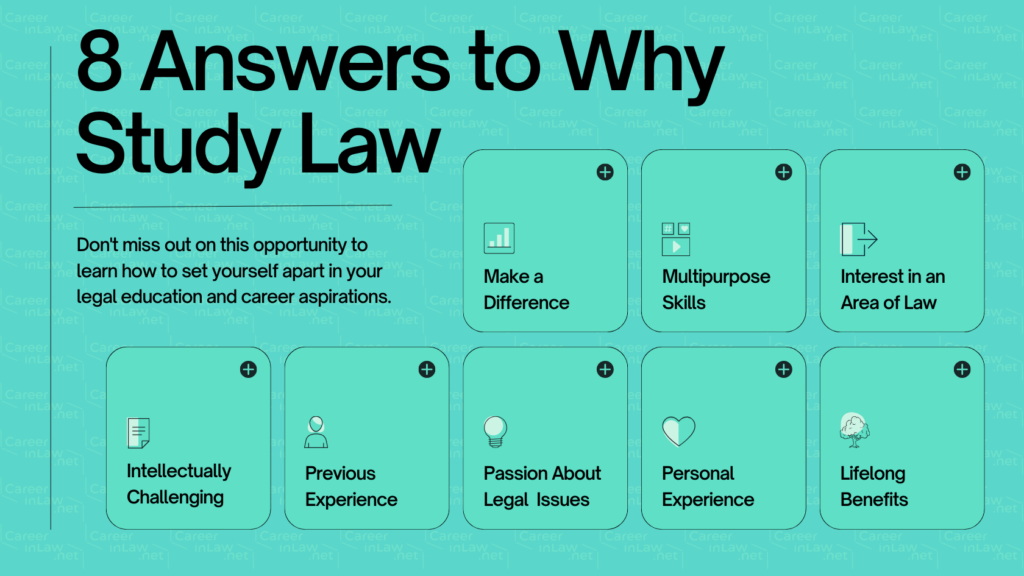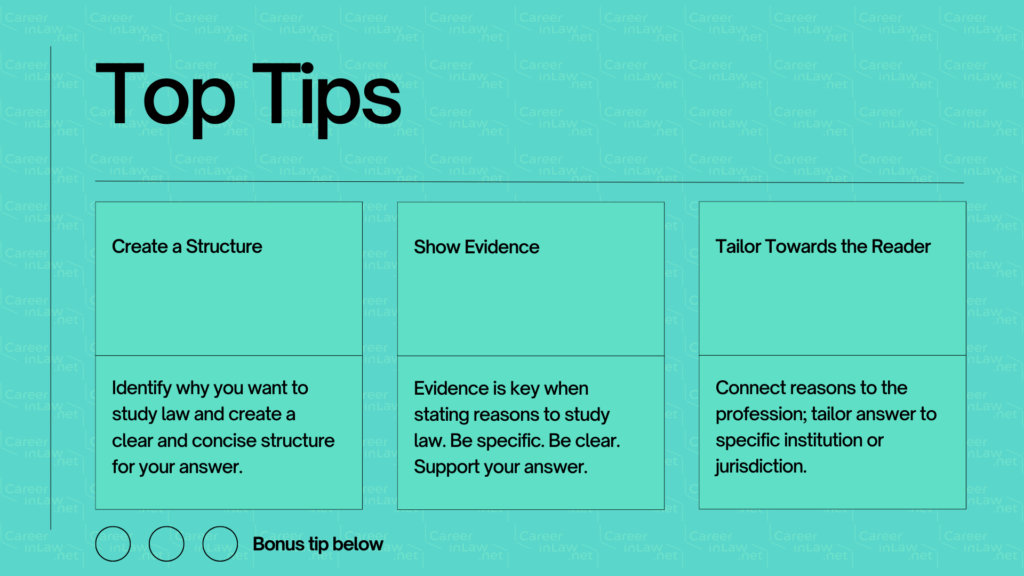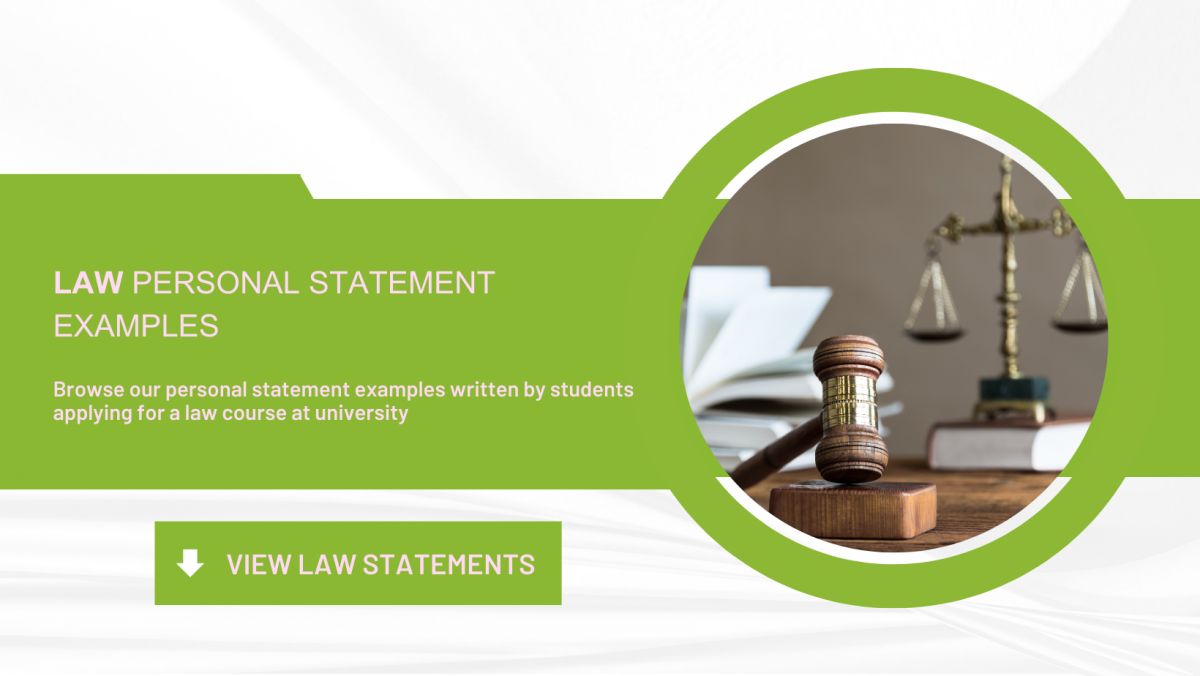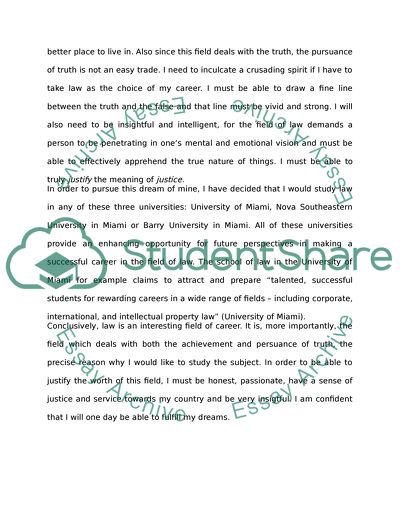- InterviewPenguin.com – Your best job interview coach since 2011

Why do you want to be a lawyer? Best sample answers
Studying law is no walk in a park . You’ll have to sacrifice a lot , and you will typically pay a lot for your degree–for a mere chance of obtaining it. What’s more, the demand for the places in the study program is incredibly high at any decent university offering law degrees . You will compete with many other people in the admission interviews, and unless you convince the committee of your motivation, they will choose someone else, and you will have to try your luck elsewhere, or wait one more year. So, why law ? Why did you choose law as a career?
Let’s have a look at 7 sample answers to the question. I tried to include in my selection a variety of answers, referring to different reasons, including some unconventional answers . Read them slowly, one after one, and consider whether any of them conveys the message you want to convey in your interviews, while trying to impress the admission committee members. Once done, do not forget to check also my notes below the answers, for additional hints on how to stand out and make sure they will remember you once the interviews end, and they decide about the successful applicants.
7 sample answers to “Why are you interested in studying law?” interview question
- I see a lot of injustice in the world . And now I do not talk only about poor countries and inequality we can observe over there. When you have your eyes open, you will see things aren’t much better in the US . Especially in the corporate world, but also in the families. And I’d like to play my part in making things better . I consider specializing either in family law or environmental law , because these two fields are really close to my heart and I consider them incredibly important at the moment , and I also believe there is a lot of room for new quality lawyers, people who can make some difference . I find it fascinating to imagine that I represent interests of people in front of a court one day. And though the road ahead is long, I am motivated and ready to try my best.
- I want to be completely honest with you: money is my main driving force. Let’s look at things as they are. I am lucky enough to belong to the brightest students in my city, and I also enjoy studying and working hard on my skills. With my grades and resume, I could get to almost any college , and study any subject. Because I know I would manage it, and I know they would accept me. So why not to try going for the pinnacle? Lawyers and other legal professionals earn excellent salaries and enjoy a lot of respect in their circles. And I would love to find myself in the same position one day, because I do not dream of earning an average wage. I want to make it big in my career, and provide for my family.
- I find law and excellent match for my personality and strengths . To start with, I have a great memory , excellent communication and argumentation skills. I am also extremely ambitious, but have strong moral codex at the same time, which I believe is a good combination for any lawyer. And I enjoy talking to people, especially from the business world. That’s why I’d love to specialize in corporate law, and perhaps one day have my own legal office . This is why I want to be a lawyer, and not a doctor for example.
- I see law as a degree which offers one almost unlimited options on the employment market. Sure, the competition is huge. But nowadays, each organization, public or private, need someone with legal knowledge , someone who makes sure they adhere to the laws and regulations and avoid fines, someone who represents them in confrontations with various regulatory bodies. I believe that once I have a degree from your university, I will have many doors open. To sum it up, I see this degree as the best possible start to my professional career .
- Three reasons. First one, love for the field . It fascinates me how a skilled lawyer can save a business millions of dollars, or save an individual from years in prison. Second reason is financial stability . Lawyers do not struggle with monthly bills. And the third, equally important reason, is job security . People and companies will always go to court, needing assistance of legal professionals. Once you establish yourself on the market and get some clientele, you do not have to worry about having little work , or about losing your job…
- I honestly believe that law is such an important part of our life , and basically omnipresent, that each lawyer can make a positive difference in the individual lives of people they work with, and represent in front of the court of justice. The idea of helping people, and at the same time getting excellent compensation for my work , truly fascinates me. I believe you cannot find any other job field with similar characteristics. On the top of that, I am a great student, and have no doubts that I will manage to pass the exams and eventually get my degree. Law is a hard field, but I feel ready to make a great career in the field.
- I’ve always felt this need to help underprivileged people protect their rights. Maybe the main reason is that I also come from an underprivileged family , and I know how hard it was to get some justice, when we needed it the most. What’s more, I just love thinking out of the box , putting things together , and I have great attention to detail. I believe that job of attorney is a perfect choice from someone like me, considering my strengths, career goals, and everything else. And I cannot wait to start.
Special Tip : What if I told you that you can practice your answers to all tricky law school interview questions, getting an immediate feedback from a life-like AI interview coach ? And that you can start doing it for free , and it is a lot of fun too? 🙂 Check out this page on our partner website , Real Mock Interviews, pick a question, enter your email, and start practicing for free , either on your mobile phone or on your computer. Check it out now and see for yourself!
Try to be specific in your answer
I know it is hard to think about your future once you are in your early twenties. You have your entire life in front of you. So many options, but also many challenges this generation faces. Anyway, try to think about your future for a few minutes before going to your law school interview.
What field of law would you prefer to specialize in later on? Criminal, civil rights, family, immigration, or even international law? Once you choose the field, think about the position you’d like to have in it, in ten years from now . Maybe you want to work for a particular company, or on a particular case.

Perhaps you want to represent a particular group of people , or help members of a specific community. And maybe you’d like to start your own legal practice eventually, working for yourself, instead of for someone else. And while your goals may change several times until you earn your degree (if you manage to earn it at all, the average dropout rate at law school is over 20% ), it is still good to have a specific vision for your future , a vision which motivates you, and will help you to handle the heavy workload at school, as well as other challenges. The more specific you are in your answer, the better your chances to succeed. I wish you good luck!
Ready to answer this question? Great! But do not forget to check also other tricky questions you may face in your school admission interview:
- Does your academic record accurately reflect your capabilities?
- Where do you see yourself in five years from now?
- How do you handle success?
- Recent Posts
© InterviewPenguin.com
Privacy Policy

Sign up to our Newsletter
How to write a 'why this law school' essay with examples.

Reviewed by:
David Merson
Former Head of Pre-Law Office, Northeastern University, & Admissions Officer, Brown University
Reviewed: 2/6/24
Entering law school? Knowing how to approach the “why law” school essay is vital—it's your tool to articulate why their institution is the ideal match for your legal goals. Let's get straight to it.
Getting into law school involves more than just grades—it's about convincing the admissions team why their school is the perfect fit for you.
In this guide, we'll walk you through the process of crafting a strong "Why This Law School" essay, using clear examples and practical advice to help your application stand out in the competitive pool of applicants. So, let's get down to the essentials that will make your essay a key asset in securing your spot at the law school of your choice.
Writing the "Why This Law School" Essay
When writing your "Why This Law School" essay, it's important to thoughtfully consider key elements to express your connection with clarity and purpose. So, let’s take a look at how to write a “why law” school essay.
Generating Ideas for Impactful Content
When you're getting ready to write your “why law” school essay, start by doing some research. Dig into the school's culture, mission, faculty, and special projects. Learn about their history and what campus life is like.
Next, think about what genuinely interests you about the school. It could be their commitment to diversity, a specific course they offer, or interesting internship opportunities . Write down these things that catch your attention.
Now, connect your own experiences, events, and skills with the things you found interesting about the school. If they're big on diversity, share your own experiences supporting inclusivity.
If there's a specific course you like, talk about how your past courses and work experiences make you a great fit. Basically, show them why you're not just any applicant but someone who can really add to what makes the school unique.
Stating Academic and Career Goals
A concise statement sets the stage, pinpointing what draws you to the school. Perhaps it's the renowned faculty or the emphasis on practical skills. Illustrate with a personal example—maybe a transformative moment during an internship or a class—that aligns with the school's values. Showcase your connection.
Highlight how your future aspirations intertwine with the school's strengths. Whether it's honing specific legal skills or contributing to a particular aspect of the academic community, paint a vivid picture of what you aim to achieve. Keep it focused, emphasizing the tapestry of alignment between your goals and the school's offerings.

Exploring Unique Opportunities Related to Your Interests
When explaining why a specific law school captures your attention, it's crucial to move beyond generic features and explore the distinctive opportunities the institution offers. For instance, consider the case of the UC Berkeley School of Law .
Dive into specific clinics like the Environmental Law Clinic, renowned professors such as Professor Abhay Aneja , or cutting-edge research projects like the Berkeley Center for Law and Technology. By delving into these unique aspects, you showcase genuine interest in what sets Berkeley Law apart.
Establishing a personal connection to these opportunities is key. It's not just about what Berkeley Law provides; it's about how programs like these align with your personal and professional goals.
This connection adds depth to your application, demonstrating how you'll not only benefit from these opportunities but also contribute positively to the overall Berkeley Law community. Effectively communicating this alignment enhances your case for being an ideal fit for the institution.
Adding Top Academic and Extracurricular/Social Reasons for Application
Crafting a compelling application involves presenting a balanced approach that seamlessly integrates both academic and extracurricular or social reasons for your choice. Showcase a comprehensive understanding of the law school's offerings, not only in terms of curriculum but also in the broader context of the overall student experience.
To demonstrate fit, articulate how your academic pursuits align harmoniously with the school's curriculum. Illustrate how the courses, faculty expertise, and academic environment resonate with your educational goals. Simultaneously, emphasize how your extracurricular interests contribute meaningfully to the broader community.
Whether it's involvement in student organizations, community service, or social initiatives, conveying a holistic engagement paints a picture of a candidate who will not only excel academically but also enrich the social fabric of the law school.
Knowing the Right Essay Length
If there are no guidelines, aim for around one double-spaced page, roughly 250–350 words. Format your essay like your personal statement, using "Interest in School X" in the header unless the application specifies otherwise (e.g., "Supplemental Essay One"). This ensures a smooth and organized flow of your thoughts throughout your application.
Thinking about length isn't just a detail; it's a sign of respecting the application process and the committee's time. This consideration makes your response more impactful and shows you get the importance of being concise without losing depth.
Seeking Professional Assistance
Starting your law school journey involves complexities, from crafting a strong application to excelling in standardized tests like the LSAT , GRE, Bar Exam, or MPRE. At Juris Education, our experienced admissions counselors are here to guide you through every step.
Navigating the details of expressing your achievements and overcoming setbacks can be challenging. Our team offers personalized guidance to help you strategically present your unique strengths, ensuring they connect with admissions committees.
Our consulting services are more than just advice; they make a real difference. Specifically designed for applicants dealing with challenges like low GPAs or LSAT scores, we specialize in turning setbacks into strengths, significantly improving your chances of acceptance.
We work closely with you to identify and highlight your standout qualities, tailoring your application to showcase what makes you exceptional. This personal touch sets you apart and boosts your appeal to admissions committees.
Common Mistakes to Avoid in Your “Why This Law School” Essay
Avoiding common pitfalls in your "Why This Law School" essay is crucial for clarity:
1. Vague Statements
When writing your essay, steer clear of vague language that could apply to any law school. Instead, focus on specific elements that make the institution unique, such as distinctive programs, esteemed faculty, or unparalleled opportunities.
Get into the details when discussing academic offerings—highlight faculty members aligned with your interests and pinpoint programs resonating with your academic goals. This specificity not only reveals your research depth but also establishes a thoughtful connection to the school.
2. Overemphasis on Reputation
While acknowledging a law school's prestige is vital, avoid fixating solely on reputation without linking it to your personal and professional goals. Admission committees want to understand how the school's reputation aligns with your aspirations and why it's the ideal place for your legal education.
Connect the school's reputation to your objectives to provide a nuanced perspective. For instance, if a law school is renowned for environmental law , emphasize this alignment if you're passionate about environmental advocacy.
3. Ignoring Extracurricular/Social Aspects
Don't overlook the significance of social and extracurricular factors in your decision-making process. Law school extends beyond academics; it's a comprehensive experience involving a community, networking opportunities, and extracurricular activities . Integrate both academic and extracurricular aspects into your essay.
Discuss how the law school's social environment, student organizations, and community engagement contribute to a holistic educational experience. This showcases a well-rounded understanding of the institution and its role in your overall legal education.

Structuring Your "Why This Law School?" Essay Effectively
Let's dive into how to make your "Why This Law School?" essay stand out by structuring it effectively.
Outlining Key Points and Themes
Making your "Why This Law School?" essay easy to understand involves a strategic approach:
1. Identify School-Specific Elements
Begin by pinpointing specific aspects of the law school that catch your interest—unique programs, esteemed faculty, or notable achievements. This lays the groundwork for a focused and impactful essay.
For instance, if the law school is known for its environmental law program and you're passionate about sustainability, highlight this in your essay. Show a deep understanding of the school's offerings and how they align with your personal and professional goals.
2. Prioritize Impactful Points
Once you've figured out what matters to you, rank them based on how much they affect your decision. What stands out the most to you? What fits well with your career goals? Putting the most impactful points first helps keep your essay clear and persuasive.
For instance, if the law school has a special program where you can work directly with clients, and this lines up with your goal of getting hands-on legal experience, make sure to highlight this. The goal is to show a sincere and careful tie to the institution.
3. Create a Logical Flow
Plan your essay with a clear order, starting with the most important points. Transition smoothly between your academic, extracurricular, and personal experiences to create a cohesive story that highlights your deep understanding of the law school and why it suits you.
For example, if your interest in environmental law relates to your commitment to community service, make sure to emphasize this connection. A well-structured and logically flowing essay enhances readability and strengthens your overall argument for why the law school is an ideal match for you.
Combining Academic and Extracurricular/Social Reasons
Ensuring balance is key when shaping your "Why This Law School?" essay. It's not just about academics; it's about capturing the broader law school experience. Avoid going all-in on one side; try to reflect your appreciation for academic offerings and your potential impact on the law school community.
Discuss how your academic path blends seamlessly with the social dynamics of law school. Share how your classes and extracurricular interests harmonize, illustrating how your involvement in student organizations weaves effortlessly into your coursework.
For instance, if the law school's clinical programs align with your academic groove, delve into how it extends beyond conventional study methods. Emphasize the practical, real-world learning experiences it offers.
By showcasing this interconnected approach, you demonstrate a well-thought-out perspective on your entire law school journey, adding an authentic and profound dimension to your essay.

Using Feedback and Editing Wisely
As you fine-tune your "Why This Law School" essay, let's talk about using feedback and editing in a smart and effective way.
1. Reach Out for Help
Before finishing your essay, get input from people you trust. Share your essay with mentors, peers, or advisors to get helpful feedback. Others can offer insights and spot areas for improvement that you might miss.
Choose people who know about the law school application process and can give constructive feedback on what you've written. Their input is essential for polishing both the content and presentation of your essay.
2. Revision Time
Revise your essay based on feedback, focusing on clarity, coherence, and strengthening your argument. Make sure to pay attention to suggestions that take your narrative to the next level. If feedback aligns with your goals, try to incorporate it. But, most importantly, trust your judgment and maintain the integrity of your narrative if a suggestion doesn't make sense with your vision.
3. Final Polishing
Before you submit your essay, focus on a last edit for grammar, style, and overall coherence. Make sure it fits the word or character limit and stays well-organized. Check how ideas flow, transitions between paragraphs, and the general readability.
A refined essay shows your dedication to a thoughtful application. Spend a moment on this final review to catch any remaining errors and guarantee your essay leaves the intended impression.
3 Examples of Successful “Why This Law School” Essays
Explore three successful examples of "Why This Law School" essays to gain practical insights into crafting compelling narratives and building strategic connections. Each “why law” school essay example has something to offer. Let’s get into them.
1. "Why Northwestern" Essay Example
Prompt : While other parts of your application give us a sense of who you are, we are also excited to hear more about how you see yourself engaging with the larger Northwestern community. In 300 words or less, help us understand how you might engage specific resources, opportunities, and/or communities here. We are curious about what these specifics are, as well as how they may enrich your time at Northwestern and beyond. (300 words max)
Essay Example
“I love Northwestern’s academic flexibility, including the freedom of the curriculum to explore a variety of fields and the emphasis on cross-department study. Also, the quarter system provides a faster pace of learning and the opportunity to take more classes than a semester school.
Specifically, I am excited by the Spanish and Portuguese departments and the classes on Hispanic and Lusophone culture, literature, and phonetics.
For example, the accelerated Portuguese program is a perfect way to pick up the language at a faster pace using my prior knowledge of Spanish. I intend to supplement my language acquisition through the study abroad programs offered at the Fundação Getúlio Vargas in Rio de Janeiro or an affiliate program in Santiago, Chile.
Additionally, the GESI program in Costa Rica is another intriguing opportunity through its intersectionality. It will allow me to combine a practical application of my language skills with studies in environmental conservation that I find a pressing and interesting issue. As an open-minded learner keen to forge links between academic fields of study, I believe I would be an excellent fit for the program.
I am also interested in Linguistics and pursuing undergraduate research or possibly undertaking the coterminal BA/MA program. The opportunity to link my research to a modern language of choice and investigate, for example, regional variation in Latin American Spanish or how Portuguese loanwords have infiltrated native Amazonian languages sounds fascinating and exciting.
Finally, the unique sense of community at Northwestern captivated me when I visited campus. The residential college system, the school spirit at Wildcat games, and the friendliness of the students I met, one of whom described the school as “the most welcoming place ever”, were all emblematic of this atmosphere for me. I think I will thrive in such a dynamic and inquisitive place.”
Why This Essay Works
This essay does a great job answering the prompt. It's clear and to the point. The applicant talks about why they're excited about Northwestern, like the flexibility of the curriculum and the quarter system.
They also get specific about their interests, like the Portuguese program and study abroad opportunities. Plus, they mention their enthusiasm for the community at Northwestern, which is a nice touch.
2. "Why Tufts?" Essay Example
Prompt : Which aspects of the Tufts undergraduate experience prompt your application? In short, "Why Tufts?" (150 words max)
“The cross-curricular focus and freedom of study at Tufts would allow me to pursue an interdisciplinary major and draw together my love for Spanish, Portuguese, Linguistics, and the natural sciences. This unique ability to design my own major by combining elements from a variety of academic fields definitely excites me. To support this, I intend to participate in the study abroad program in Chile or a civic semester in Urubamba, Peru that will allow me to practice my language skills while also benefitting the local community and gaining an invaluable cultural understanding through intimate homestay experience. Other than the academics, the vibrant community at Tufts also attracts me, with the warm and compassionate students acting as flattering adverts for the school. One student I spoke with described the average Jumbo as “goofy and loving” which I feel accurately matches my own character and outlook.
(144/150 words)”
This essay works because it clearly shows how Tufts University's cross-curricular approach aligns with the applicant's academic interests in Spanish, Portuguese, Linguistics, and the natural sciences.
It also conveys the applicant's intention to craft a unique major and engage in enriching experiences like studying abroad and contributing to local communities. Additionally, it portrays Tufts as a welcoming and compassionate community through the description provided by a current student, making a strong case for why the applicant is interested in the university.
3. "Why Tulane?" Essay Example
Prompt : Please describe why you are interested in attending Tulane University (optional). (50-800 words)
“Tulane University has a unique history, deeply established in the city it calls home, New Orleans. After transitioning from a medical school to a full college in in 1847, then undergoing a name change from the University of Louisiana to Tulane in 1884, as the city changed, Tulane changed with it. Tulane is the crossroad of two distinctly different ideals: being rooted in tradition and adapting to the needs of modern society.
When the city was devastated by Hurricane Katrina in 2005, Tulanians answered the call to serve. Scott S. Cowen, then-President of Tulane, refused to let the hurricane ruin Tulane and the CIty. Tulanians were part of rescue and clean-up teams, devoting time and resources to rebuilding their school and the city it calls home. What was most impressive, however, was their resilience.
It would’ve been easy for the student body and staff to not come back. Being as smart and service-oriented as they are, the students and faculty could’ve found another place to live and learn easily. Yet, they returned. Tulanians have a certain sense of pride and commitment to the school that I admire.
They could’ve stayed home and not gone back, but they wanted to pick up the pieces of the school they love. It’s clear that Tulanians take ownership in their education. I want to go to a school that my peers want to go to; I want to be immersed in a community as excited about being in it as I am. That’s Tulane.
I could go on and on about Tulane’s teacher education program. I could write about how Tulane-educated teachers are leaders in their fields because they have both a degree in their area of study as well as certification to teach. Maybe I could mention the service learning requirements necessary to graduate and enter the teacher certification program, ensuring that the teachers are prepared to instill morals in the students that walk through their classroom door.
Truthfully, I could go almost anywhere to become a teacher, but only schools like Tulane that synthesize in- and out-of-classroom learning produce great ones. Tulane, like I said before, houses a resilient and altruistic student body. They served New Orleans specifically in 2005, but Tulanians serve their community every single day. Newsweek ranked Tulane 19th for service-minded schools. Likewise, the U.S. News & World Report placed Tulane in the top 25 schools for service learning. It is one of the top schools for producing Peace Corps volunteers, a program that interested me for post-graduate work.
Whether it is through Outreach Tulane, CACTUS, Wave of Green, or another similar program, I will be immersed in service work throughout my four years. Tulane stands alone in its commitment to community. Classroom education is married with service learning, producing empathetic, worldly leaders ready to set the world on fire. In my case, that will be through educating the next generation.
I need a meaningful education to be a meaningful educator. Tulane is unparalleled in its dedication to development of the students, on a personal and intellectual level. From when I touch the Victory Bell after Convocation all the way to when I say farewell at the Wave Goodbye Party at Commencement, I’ll have changed and grown, both in my mind and in my heart.
The Tulane study body is diverse and well-rounded; finding people and groups with shared interests is inevitable. I could see myself writing for the Hullabaloo or being a tutor in the After-School Newcomb Tutoring (which will bridge my learning and my intended career and give practical application to my education classes). But more so, I can just envision myself at Tulane, as a Tulanian. The willowing oak, myrtle, and cypress trees, the world-renowned research facilities, the dedicated faculty, the motivated and inspired student body, and the timeless school spirit all lend itself to a picture I can see myself in.”
This essay does a great job of showing why the applicant wants to attend Tulane University. It talks about the university's history, how it responded to Hurricane Katrina, and why the applicant is interested in their teacher education program.
It also mentions the strong commitment to service and personal growth at Tulane. Overall, it makes a strong case for why the applicant is excited about being a part of the Tulane community.
To sum it up, writing your “why law” school essay is all about storytelling. From understanding the unique aspects of law school to combining academic and extracurricular reasons, your essay is a chance to show why you're a perfect fit.
Explore the unique opportunities the school provides, creating a personal connection that enhances your application. Keep it simple: Steer clear of common mistakes, and make sure your essay is well-structured. And don't forget, the right essay length is more than a detail—it shows respect for the application process.
If you find it helpful, consider getting expert advice for a well-guided path to law school. Take inspiration from successful examples as you start your writing journey, creating a narrative that sets you apart in the competitive realm of law school applications.

Schedule A Free Consultation
You may also like.

Retaking the LSAT: Your Questions Answered

Law Schools in Oklahoma

- Skip to main content
- Skip to primary sidebar
Careerinlaw.net | UK
Why Study Law: Answers for Career Reasons and Essay Structure
Home » Application Questions and Answers » Why Study Law: Answers for Career Reasons and Essay Structure
- “Why study law?” essay question;
- “What is your motivation to study law?” job application question;
- “Why study law?” personal statement question;
- “Why study law?” interview question;
- “Why is law interesting?” law school application question;
- “Why study law in the UK?” question for international students; or
- “Why law?” application question.
8 Answers to Why Study Law
- Intellectually Challenging
- Allows You to Make a Difference
- Develop Multipurpose Skills
- Previous Learning Experience
- Passionate About Legally Connected Issues
- Personal Experience as a Reason to Why Study Law
- Interest in an Area of Law
- Lifelong Learning and Adaptability

1 – Intellectually Challenging
2 – allows you to make a difference, 3 – develop multipurpose skills.
- Business development;
- Drafting; and
4 – Previous Learning Experience
5 – you are passionate about legally connected issues.
- government policy;
- legislative processes;
- political developments; and
- international relations.
6 – Personal Experience as a Reason to Why Study Law
7 – interest in an area of law, 8 – lifelong learning and adaptability, why i chose to study law essay structure.
- Introduction: Start with a compelling hook, briefly introducing your motivation for studying law.
- Personal Journey: Share personal experiences or encounters that sparked your interest in law.
- Academic and Professional Goals: Explain how a law degree aligns with your academic aspirations and career objectives.
- Specialization Interests: If you have specific areas of law you are interested in, mention how they relate to your overall goals.
- Conclusion: Tie your personal, academic, and professional reasons together, reflecting on how a law degree will help you achieve your life objectives.
3 Tips on How to Excel in Your Answer

1 – Create a Structure
2 – show evidence, 3 – tailor towards the reader, 4 – bonus tip: why commercial law.
- “Why have you chosen a career in commercial law? Explain what motivates you”
Example Answers to Why Study Law
Exclusive Industry Scoop
- Name * First Last
- Degree Type * Your Current Level of Study LLB LPC PGDL BPTC SQE Prep LLM
- Comments This field is for validation purposes and should be left unchanged.
How to Answer the "Why Law School?" Essay Question
Are you struggling with the "Why Law School?" essay question? This article provides expert tips and strategies to help you craft a compelling answer that showcases your passion for the law and your unique qualifications.
Posted May 12, 2023

Featuring Cian S.
Law School: Crafting a Compelling Personal Statement
Friday, april 19.
8:00 PM UTC · 45 minutes
If you are considering applying to law school, you will need to write a "Why Law School?" essay. This essay is an opportunity for you to explain why you want to pursue a legal education and why you are a strong candidate for admission to a particular law school. The essay is an important part of the application process and can ultimately make or break your chances of being accepted. In this article, we will provide you with a comprehensive guide on how to answer the "Why Law School?" essay question.
The Importance of Addressing the "Why Law School?" Essay Question
The "Why Law School?" essay question is an opportunity for you to showcase your motivation, passion, and qualifications for pursuing a legal education. The essay allows admissions officers to understand your goals and aspirations, as well as your fit with a particular law school. It is important to address the essay question explicitly and thoughtfully as it can significantly impact your application's success.
One way to approach the "Why Law School?" essay question is to research the law school and its programs thoroughly. This will allow you to tailor your essay to the specific school and demonstrate your knowledge and interest in the institution. Additionally, you can use the essay to highlight any unique experiences or skills that make you a strong candidate for law school. Remember, the essay is not just about explaining why you want to go to law school, but also about showcasing why you are a good fit for the school and the legal profession.
Understanding the Purpose of the "Why Law School?" Essay Question
The "Why Law School?" essay question is designed to help admissions officers understand your motivations, goals, and fit with a particular law school. The question is intended to be open-ended, allowing you to provide a unique and personal response. Your essay should demonstrate your understanding of the legal field and showcase your qualifications and interests.
It is important to note that the "Why Law School?" essay question is not just about explaining why you want to attend law school, but also why you want to attend that specific law school. Admissions officers want to see that you have done your research and have a genuine interest in their institution. This can include discussing specific programs, clinics, or professors that align with your career goals. Additionally, your essay should highlight how you can contribute to the law school community and what unique perspectives or experiences you can bring to the table.
Researching Law Schools Before Writing the Essay
Before writing the "Why Law School?" essay, you should research the law schools you are interested in attending. This research will help you understand the school's academic programs, faculty, resources, and culture. It is important to identify how the school aligns with your personal and professional goals, and emphasize this connection in your essay.
One important aspect to consider when researching law schools is their location. Some law schools are located in urban areas, while others are in more rural settings. This can impact your overall experience as a student, as well as your opportunities for internships and networking. Additionally, you should research the school's alumni network and job placement rates to get a sense of the career opportunities available to graduates.
Another factor to consider is the school's approach to teaching and learning. Some law schools emphasize a more theoretical approach, while others focus on practical skills and experiential learning. Understanding the school's teaching philosophy can help you determine if it is a good fit for your learning style and career goals.
Highlighting Your Personal Motivations for Attending Law School
Your "Why Law School?" essay should highlight your personal motivations for attending law school. This can include your interests in law, social justice, advocacy, or any other relevant experiences. Your essay should showcase your passion and enthusiasm for the legal field.
Additionally, it is important to explain how attending law school aligns with your long-term career goals. This can include specific legal fields you are interested in pursuing, such as environmental law or intellectual property law. You can also discuss how a law degree will help you achieve your career aspirations, whether it be working in a law firm, government agency, or non-profit organization. By demonstrating a clear understanding of your career goals and how law school fits into them, you can further emphasize your commitment to pursuing a legal education.
Demonstrating Your Knowledge of the Legal Field
Your "Why Law School?" essay should demonstrate your knowledge of the legal field. This knowledge can come from previous experiences, such as internships or work experience, or through academic coursework. A deep understanding of the legal field will show admissions officers that you are prepared for the rigors of law school and committed to pursuing a legal education.
Additionally, you can also demonstrate your knowledge of the legal field by discussing current events and issues within the industry. This shows that you are not only knowledgeable about the past and present of the legal field, but also aware of its future direction and potential challenges. Including examples of how you have stayed up-to-date with legal news and developments can further strengthen your essay and showcase your passion for the field.
Showcasing Your Career Goals and Aspirations
Your "Why Law School?" essay should showcase your career goals and aspirations. This can include identifying the type of law you want to practice or explaining how a legal education will contribute to your long-term career aspirations. It is important to be specific in your goals and demonstrate how attending law school aligns with your overall career plan.
Additionally, you may want to consider discussing any relevant experiences or skills that have prepared you for a career in law. This could include internships, volunteer work, or previous jobs that have given you exposure to the legal field. By highlighting these experiences, you can demonstrate your commitment to pursuing a career in law and show admissions committees that you have a strong foundation to build upon in law school.
Incorporating Your Background and Life Experiences into the Essay
Your "Why Law School?" essay should incorporate your background and life experiences into your response. This can include explaining how your personal or professional experiences have led you to pursue a legal education. It is important to showcase how your unique perspective and experiences will enrich the law school community.
For example, if you have worked in a non-profit organization, you can discuss how this experience has given you a deeper understanding of the legal system and how it affects marginalized communities. Alternatively, if you have a background in science or engineering, you can explain how this has given you a unique perspective on the intersection of technology and the law.
Avoiding Common Mistakes in Writing the "Why Law School?" Essay
When writing the "Why Law School?" essay, it is important to avoid common mistakes. These can include being too generic in your response, not demonstrating your fit with a particular school, or not being specific enough in your career goals or motivations. It is important to carefully read and follow the essay prompt and align your response with the law school's mission and values.
Another common mistake to avoid when writing the "Why Law School?" essay is focusing too much on your academic achievements and not enough on your personal experiences and qualities. Admissions committees want to see that you have a genuine passion for the law and a clear understanding of how pursuing a legal education will help you achieve your goals. Therefore, it is important to showcase your unique perspective and experiences, and how they have shaped your desire to attend law school.
Emphasizing Your Fit with the Law School's Culture and Curriculum
Your "Why Law School?" essay should emphasize your fit with the law school's culture and curriculum. This can include highlighting the school's unique academic programs, extracurricular activities, or faculty. Your essay should showcase why the law school is the best fit for you and how you will contribute to the school's community.
Additionally, it is important to research the law school's mission statement and values to ensure that your essay aligns with their goals. You can also mention any relevant experiences or skills that make you a strong candidate for the school. Remember to be specific and provide examples to support your claims. By demonstrating your fit with the law school's culture and curriculum, you increase your chances of being accepted and thriving in the program.
Using Specific Examples to Support Your Arguments
Your "Why Law School?" essay should use specific examples to support your arguments. This can include citing specific academic programs or faculty at the law school or discussing particular experiences or achievements that demonstrate your fit with the school. It is important to provide evidence to support your claims and demonstrate your unique qualifications.
Crafting a Convincing and Cohesive Narrative in Your Essay
Your "Why Law School?" essay should tell a convincing and cohesive narrative. This means that you should create a clear and logical structure for your essay, with a clear introduction, body, and conclusion. Your essay should have a strong, central theme that ties together your arguments and demonstrates your overall fit with a particular law school.
Polishing and Editing Your "Why Law School?" Essay to Perfection
Before submitting your "Why Law School?" essay, it is important to polish and edit your writing to perfection. This means carefully proofreading your essay for errors in grammar, spelling, and punctuation. It also means ensuring that your essay follows the correct word count and formatting guidelines. A polished and well-written essay will make a strong impression on admissions officers.
Tips from Admissions Officers on Writing an Effective "Why Law School?" Essay
Admissions officers recommend that you take the time to carefully read and follow the essay prompt, research the law school thoroughly, and write a unique and personal response. It is important to showcase your passion for the legal field and align your response with the law school's values and mission. A strong and effective essay will make a memorable and positive impression on admissions officers.
Conclusion: Key Takeaways for Writing a Compelling "Why Law School?" Essay
The "Why Law School?" essay question is an important part of the law school application process. To write a compelling essay, it is important to research the law school, demonstrate your knowledge and passion for the legal field, identify your personal motivations and career goals, and showcase your fit with a particular law school. By following these key steps and tips, you can write a successful "Why Law School?" essay that will help you stand out from other applicants and secure your place in your dream law school.
Browse hundreds of expert coaches
Leland coaches have helped thousands of people achieve their goals. A dedicated mentor can make all the difference.
Browse Related Articles

May 12, 2023
How to Get Off the Law School Application Waitlist: Tips and Strategies for Admission
Are you stuck on the law school application waitlist? Don't worry, we've got you covered.

Rising Above Limits: How to Get Into T14 Law Schools with a Low LSAT Score
Discover the secrets to getting into top-tier law schools with a low LSAT score.

7 Law School Essay Tips to Help You Stand Out in 2023
If you're planning to apply to law school in 2023, you'll want to read these 7 essay tips that will help you stand out from the competition.

The Pros and Cons of Using a Law School Admissions Coach
Considering hiring a law school admissions coach? Our article explores the advantages and disadvantages of using one, helping you make an informed decision about whether or not to seek professional guidance in your law school application process..

How to Pick the Perfect Law School Admissions Consultant for Your Background
Are you considering hiring a law school admissions consultant? Learn how to choose the perfect consultant for your unique background and goals with our comprehensive guide.

How to Get Into Law School as a Transfer Applicant
Are you considering transferring to a law school? Our article on "How to Get Into Law School as a Transfer Applicant" provides valuable insights and tips to help you navigate the transfer process successfully.

How to Get Into Law School from a Non-Legal Background
Are you interested in pursuing a career in law but come from a non-legal background? This article will provide you with valuable insights and tips on how to get into law school and succeed in your legal career.

How to Get Into Law School From a STEM Background
Are you a STEM major interested in pursuing a career in law? Our article "How to Get Into Law School From a STEM Background" provides valuable tips and insights on how to make the transition, including advice on preparing for the LSAT, highlighting your unique skills, and choosing the right law school program.

How to Get Into Law School as an Overly-Represented Candidate
Are you an overly-represented candidate looking to get into law school? Our article provides practical tips and strategies to help you stand out in the application process and increase your chances of acceptance.

Breaking Barriers: How to Successfully Apply to T14 Law Schools with a Low GPA
If you have a low GPA but dream of attending a T14 law school, this article is for you.

June 5, 2023
Beyond the LSAT and GPA: Other Factors That Can Impact Law School Admissions
Discover the other factors that can impact your chances of getting into law school beyond just your LSAT and GPA.

How to Get Into Law School as a Non-Traditional Candidate
Are you a non-traditional candidate looking to get into law school? This article provides valuable insights and tips on how to navigate the admissions process, highlight your unique experiences, and stand out among traditional applicants.
How to Write a 'Why This Law School' Essay
Here's how to respond when a law school asks about your specific interest in them.
Writing a 'Why This Law School' Essay

Getty Images
Law schools value applicants who show they have done their research about where they are applying, because the investment of time and energy shows genuine interest and because research is a core legal skill.
Strong law applicants tend to have carefully considered why they are applying to law school , and they understand that their application essays need to express their interest in a legal career.
However, many are stumped when law school applications ask them a narrower question: Why are you applying to this law school?
Most commonly, law schools may ask this question through a supplemental application essay , sometimes called a “Why X School” or “Why This School” essay.
For example, the University of Notre Dame Law School offers applicants an optional statement of no more than two double-spaced pages “to express a specific interest in Notre Dame Law School.” The School of Law at the University of California—Irvine has a mandatory essay of up to 750 words about why you are interested in their school.
Other schools may ask applicants to address this question within their personal statement with a short-answer prompt. It is also a common interview question.
By asking applicants about their specific interest in a school, admissions officers turn the table on applicants. After all, applicants take pains to distinguish themselves by showing that their grades and test scores don’t reveal other factors that set them apart. With a “Why This School” question, law schools say: We’re unique, too. Why are you choosing us?
Ironically, many applicants have given little thought to what separates one law school from another! As you can imagine, admissions offices are not thrilled about this. They certainly don’t see themselves as gatekeepers to a generic, interchangeable institution.
Answering a “Why This School” essay can be frustrating. How do you articulate your interest without resorting to boilerplate flattery about a school’s prestigious faculty and beautiful campus?
Learn About a Law School Through an Event, Interview or Visit
Since many applicants apply to a wide range of law schools, they may not know much about each one.
One of the best ways to learn about a law school is at a law school forum or information session. Many schools host online events, which can be convenient for applicants unable to visit the law school in person.
Look for these things
If you have a chance to speak with an admissions officer, you can ask good questions to learn more about how the school sets itself apart from others.
You may also learn about a law school by talking to current or former students about their experience on campus.
Research What a Law School Offers
Use search engines like Google News or LexisNexis to find any mentions of the school in the press. Did the law school recently open a new building or center, or announce a new policy that might affect your interest?
Most importantly, carefully review the law school’s website . Law school websites are one of the best ways to learn about a school: how it sees itself, what it offers and what’s going on. While law school websites might look unremarkable at first, close reading can reveal valuable details.
Compare multiple law school websites and notice the differences between them in style and content. Often, the words and images they use are meticulously crafted to present and promote a distinct identity. Without copying their phrasing word for word, reference these ideas in your essays to reflect an understanding of a school’s unique character while avoiding cliches and generalities.
Find Areas of Overlap
Law schools differ in their size, geography , culture, curricula, special programs, campus activities and many other ways. These distinctions provide perspectives on how each law school stands out.
Based on your research, make a list of strengths for each of your target schools that are relevant to your interests as a candidate. For example, if your personal statement is about your dream of becoming a prosecutor, look for clinics, research centers, programs, professors or distinguished alumni in the criminal law field.
Focus on a Few Specific Points
When elaborating on the reason you are interested in a school, don’t try to “flood the zone.” Broad compliments may sound insincere.
In a “Why This School” essay or interview response, center your answer on a few concrete reasons.
Try to keep the reasons varied. For example, rather than mention three clinics you find interesting, think about other potential points of intersection, like a personal connection or a geographic interest.
Think realistically about your plans for law school and beyond . It would be more effective to thoughtfully explain why a professor’s research interests align with your own than to rattle off every relevant course in the catalog.
Ultimately, “why” questions are about connecting a law school to yourself. Answer with confidence by researching and identifying a few specific ways in which a school’s unique offerings match with what sets you apart.
Tips to Boost a Law School Application

Tags: law school , graduate schools , education , students
About Law Admissions Lowdown
Law Admissions Lowdown provides advice to prospective students about the law school application process, LSAT prep and potential career paths. Previously authored by contributors from Stratus Admissions Counseling, the blog is currently authored by Gabriel Kuris, founder of Top Law Coach , an admissions consultancy. Kuris is a graduate of Harvard Law School and has helped hundreds of applicants navigate the law school application process since 2003. Got a question? Email [email protected] .
Popular Stories
Paying for Graduate School

Medical School Admissions Doctor

Best Graduate Schools

Law Admissions Lowdown

Applying to Graduate School

You May Also Like
Mba scholarships.
Sammy Allen April 4, 2024
Special Master's Programs and Med School
Renee Marinelli, M.D. April 2, 2024

15 Famous Fulbright Scholars
Cole Claybourn April 1, 2024
When to Expect Law School Decisions
Gabriel Kuris April 1, 2024
How to Decide if an MBA Is Worth it
Sarah Wood March 27, 2024
Choosing A Major for Med School
Andrew Bauld March 26, 2024

Handling a Law School Rejection Letter
Gabriel Kuris March 25, 2024

College Majors and MBA Admissions
Anthony Todd Carlisle March 20, 2024

Tips While Awaiting Med School Decision
Zach Grimmett March 19, 2024

2024 Best Grad Schools Rankings Coming
Robert Morse and Eric Brooks March 19, 2024

Explaining Why You’re Applying to Their Law School (The "Why X" Essay)
Among the many optional essays law schools may ask you to write, one of the most common is the "Why X" essay—essentially, an essay in which you describe to the law school why you are interested in attending that school in particular.
On a cursory level, it may seem very easy to write this type of essay. You write one template, drop in the proper nouns related to the specific institutions, and you’re ready to submit. This method can produce a very generic essay, though, and one that likely won't help your chances of admission. If it feels like fluff, it most likely is a bit superficial, and admissions committees will quickly make the same determination—they have seen this all before.
What’s the best approach, then, to craft a “Why X” essay that truly makes a positive impact on your application and is distinct for each school?
The University of Pennsylvania Law School, for example, asks the “Why Penn” question in a unique manner that is designed to get you to a deeper level. Essentially, Penn asks you to identify how your interests, goals, and values connect to Penn Law’s core values. This concept is a great direction for any Why X Law School essay. Figure out what motivates you, find those opportunities at each law school that requires a “Why X” essay, and then highlight those activities in your essay. Don’t just list them—instead, connect them to what motivates you.
“I’m an EMT and a Health Science major, and I’ve seen America’s health crisis from both the academic and practical level on the ground. I want to get involved in Princeton Law School’s Rural Health Clinic because too many people do not know how to navigate the system.”
“I’m an engineer, and Dartmouth Law’s Journal of Science and Technology would be an ideal way for me to take a leadership role in researching and recommending federal and state regulations that are necessary for the safe and orderly institution of artificial intelligence technology.”
Both of these statements specifically connect the applicant's background and experience to one of the school’s opportunities, rather than just saying "I'm very interested in X clinic" or "Y Journal really appeals to me." By personalizing why the school’s opportunities have motivated you to apply, you will help the school better understand how you fit with their institution, and it may also convince them that you are more likely to enroll than the next applicant (the core goal of submitting a Why X).
"Why X" Essay Dos and Don'ts
- DO check to see if the school has any specific formatting or length requirements or guidelines in their instructions, before you start drafting. If not, we generally advise applicants keep their "Why X" essay to about one page, at 1’’ margins and 11- or 12-point font.
- DON'T write a "Why X" essay for every school you apply to. Some schools don’t want them. Some schools ask for them specifically, which is a clear indication that you should write one. Alternatively, at other schools, a “Why” essay is not requested but has still been shown to be strategically advantageous to submit. So, read the application instructions and do your research to figure out for which schools you should be writing this type of essay, and which schools do not welcome them.
- DO lead with the personal . Start with a personal connection if you can. Have you ever visited the school? Do you know someone who attends and have you heard good things from that perspective? What was your introduction to the school? These are often the strongest and most differentiating components of a “Why X” essay, if they apply to you.
- DON'T rely on templates. Some templating is natural for "Why X" essays, but spend time personalizing the essay to the school beyond just dropping in relevant info. And be incredibly careful to avoid leaving in references that do not apply to a specific school (e.g. “I like the feel of a college town” when the school is in a big city).
- DO research. The ideal "Why X" essay doesn't start and end with information that can be found on the law school's website, but you should still spend some time there. In addition to learning about the school's areas of strength, clinics, professors, journals, etc., check out the news/updates sections of the website or watch a student video; perhaps there will be something that resonates and relates to your interests and goals, and you can comment on it in your statement. Outside of the law school's substantive offerings, you can also mention things like class size, location, and atmosphere (but make sure that you give a reason “why” that also tells the reader about yourself).
- DON'T make it all about them. The "Why X" essay should tell the school more about you than it does about themselves. They already know about their programs and the information provided on their website, so it's not about listing the programs or courses and saying that you would be interested in them—it's more about why you are interested in them and how that relates to your goals, interests, learning styles, and preferences.
- DO incorporate the law school's "brand" into your essay, if applicable. Reviewing the law school's website, if it is well-executed, will teach you how the law school likes to talk about itself. Do they focus on “breadth and depth” or “an intimate seminar-style environment” or “close attention from faculty”? These can be useful concepts to use in a "Why X" essay, especially if you can connect them to your personal background, values, and goals.
- DON'T write anything that conflicts with your other application components. Your "Why X" essay, like every other component of your application, will not be read or evaluated in a vacuum. If you write your whole personal statement about your background working in public service and how you want to be a public interest lawyer, your "Why X" essay shouldn't center on the school's corporate law offerings. The more cohesive your "Why X" essay is with the rest of your application, the more authentic it will read. For example, talking about your focus on health law and how you are interested in a school’s Health Law Clinic is more powerful if you can back it up with extracurriculars, jobs, and/or other experiences in the healthcare system that show up in other components of your application.
- DO visit the law school, attend a recruiting event, or otherwise personally engage with the admissions office if you can. A well-written "Why X" essay can pack even more of a punch if it's backed up by records of real engagement with that law school, whether through a visit to campus, stopping by their table at an LSAC forum, or even attending a webinar from the admissions office. Then talk about your experience and what you learned in your "Why X" essay! Be sure to give specifics.
These are just a few suggestions that can help you write a strong "Why X" essay, but we also recommend having someone else read your essay before you submit. It is essential to make sure that the essay comes across as well-written and sincere (and the more personal connections you can make to the school, the more genuine you will seem).
- Applying to Uni
- Apprenticeships
- Health & Relationships
- Money & Finance
Personal Statements
- Postgraduate
- U.S Universities
University Interviews
- Vocational Qualifications
- Accommodation
- Budgeting, Money & Finance
- Health & Relationships
- Jobs & Careers
- Socialising
Studying Abroad
- Studying & Revision
- Technology
- University & College Admissions
Guide to GCSE Results Day
Finding a job after school or college
Retaking GCSEs
In this section
Choosing GCSE Subjects
Post-GCSE Options
GCSE Work Experience
GCSE Revision Tips
Why take an Apprenticeship?
Applying for an Apprenticeship
Apprenticeships Interviews
Apprenticeship Wage
Engineering Apprenticeships
What is an Apprenticeship?
Choosing an Apprenticeship
Real Life Apprentices
Degree Apprenticeships
Higher Apprenticeships
A Level Results Day 2024
AS Levels 2024
Clearing Guide 2024
Applying to University
SQA Results Day Guide 2024
BTEC Results Day Guide
Vocational Qualifications Guide
Sixth Form or College
International Baccalaureate
Post 18 options
Finding a Job
Should I take a Gap Year?
Travel Planning
Volunteering
Gap Year Guide
Gap Year Blogs
Applying to Oxbridge
Applying to US Universities
Choosing a Degree
Choosing a University or College
Personal Statement Editing and Review Service
Guide to Freshers' Week
Student Guides
Student Cooking
Student Blogs
- Top Rated Personal Statements
Personal Statement Examples
Writing Your Personal Statement
- Postgraduate Personal Statements
- International Student Personal Statements
- Gap Year Personal Statements
Personal Statement Length Checker
Personal Statement Examples By University
Personal Statement Changes 2025
- Personal Statement Template
Job Interviews
Types of Postgraduate Course
Writing a Postgraduate Personal Statement
Postgraduate Funding
Postgraduate Study
Internships
Choosing A College
Ivy League Universities
Common App Essay Examples
Universal College Application Guide
How To Write A College Admissions Essay
College Rankings
Admissions Tests
Fees & Funding
Scholarships
Budgeting For College
Online Degree
Platinum Express Editing and Review Service
Gold Editing and Review Service
Silver Express Editing and Review Service
UCAS Personal Statement Editing and Review Service
Oxbridge Personal Statement Editing and Review Service
Postgraduate Personal Statement Editing and Review Service
You are here
- Mature Student Personal Statements
- Personal Statements By University
- Accountancy and Finance Personal Statements
- Actuarial Science Personal Statements
- American Studies Personal Statements
- Anthropology Personal Statements
- Archaeology Personal Statements
- Architecture Personal Statements
- Art and Design Personal Statements
- Biochemistry Personal Statements
- Bioengineering Personal Statements
- Biology Personal Statements
- Biomedical Science Personal Statements
- Biotechnology Personal Statements
- Business Management Personal Statement Examples
- Business Personal Statements
- Catering and Food Personal Statements
- Chemistry Personal Statements
- Classics Personal Statements
- Computer Science Personal Statements
- Computing and IT Personal Statements
- Criminology Personal Statements
- Dance Personal Statements
- Dentistry Personal Statements
- Design Personal Statements
- Dietetics Personal Statements
- Drama Personal Statements
- Economics Personal Statement Examples
- Education Personal Statements
- Engineering Personal Statement Examples
- English Personal Statements
- Environment Personal Statements
- Environmental Science Personal Statements
- Event Management Personal Statements
- Fashion Personal Statements
- Film Personal Statements
- Finance Personal Statements
- Forensic Science Personal Statements
- Geography Personal Statements
- Geology Personal Statements
- Health Sciences Personal Statements
- History Personal Statements
- History of Art Personal Statements
- Hotel Management Personal Statements
- International Relations Personal Statements
- International Studies Personal Statements
- Islamic Studies Personal Statements
- Japanese Studies Personal Statements
- Journalism Personal Statements
- Land Economy Personal Statements
- Languages Personal Statements
Law Personal Statement Examples
- Linguistics Personal Statements
- Management Personal Statements
- Marketing Personal Statements
- Mathematics Personal Statements
- Media Personal Statements
- Medicine Personal Statement Examples
- Midwifery Personal Statements
- Music Personal Statements
- Music Technology Personal Statements
- Natural Sciences Personal Statements
- Neuroscience Personal Statements
- Nursing Personal Statements
- Occupational Therapy Personal Statements
- Osteopathy Personal Statements
- Oxbridge Personal Statements
- Pharmacy Personal Statements
- Philosophy Personal Statements
- Photography Personal Statements
- Physics Personal Statements
- Physiology Personal Statements
- Physiotherapy Personal Statements
- Politics Personal Statements
- Psychology Personal Statement Examples
- Radiography Personal Statements
- Religious Studies Personal Statements
- Social Work Personal Statements
- Sociology Personal Statements
- Sports & Leisure Personal Statements
- Sports Science Personal Statements
- Surveying Personal Statements
- Teacher Training Personal Statements
- Theology Personal Statements
- Travel and Tourism Personal Statements
- Urban Planning Personal Statements
- Veterinary Science Personal Statements
- Zoology Personal Statements
- Personal Statement Editing Service
- Personal Statement Writing Guide
- Submit Your Personal Statement
- Personal Statement Questions 2025
- Personal Statement Changes 2024

What is a law personal statement?
A law UCAS personal statement should detail why you are a great candidate for a law degree by drawing on all your skills, experience and strengths.
For many years, law has been a popular and competitive course, so it's important you make your personal statement the best it can be.
Attention to detail and the ability to form an argument are two of the most important skills required to become a good lawyer, as well as being able to support ideas with evidence.
Our law personal statement examples above will help you put together your own, unique statement, and our personal statement template and editing services can also provide further guidance.
University admissions tutors want to see you are a dedicated student that can bring value to their department, so spend as much time as possible writing the perfect statement!
How do I write a law personal statement?
A good law personal statement should include:
- career plans
- skills (e.g. analytical, problem solving, etc.) and
- achievements.
Make sure you provide examples of everything to back up what you are saying, and remember - don't tell lies, or use homour (this isn't the time or place).
Before submitting your UCAS form, give your law personal statement to friends, family and tutors for feedback and incorporate any amendments that you think will improve your statement further.
What should I include in my law personal statement?
- First of all, look at university websites (particularly those you are applying to) for any tips and advice they have on personal statements for their law degrees. Any information straight from the horse's mouth is always a bonus!
- Demonstrate your aptitude for the course you’ve chosen. For example, a criminal law personal statement might mention some work experience with the local police, while an international law personal statement might reference some extra reading you’ve done on international cases.
- Talk about your work experience - whether you have worked in a shop or cafe, or volunteered at a local community centre, make sure you include any relevant skills you learned during this time. For example, the laws on tipping staff, or how many hours you are allowed to work as a volunteer.
- The best law personal statements always show passion for the subject, and why pursuing law is so important to you.
For more help and advice on what to write in your law personal statement, please see:
- Personal Statement Editing Services
- Personal Statement Tips From A Teacher
- Analysis Of A Personal Statement
- The 15th January UCAS Deadline: 4 Ways To Avoid Missing It
- Personal Statement FAQs
- Personal Statement Timeline
- 10 Top Personal Statement Writing Tips
- What To Do If You Miss The 15th January UCAS Deadline.
How do I write a law personal statement introduction?
You should write about your initial interest in law, but make sure you explain where this interest came from, and isn't just a last-minute decision because you had to pick a subject to study.
An anecdote often works well here (if you have one) to help draw the reader in and act as a hook for your statement. For example, you might talk about an injustice you witnessed as a child, or how a family member's experience with the law made you want to learn more about it.
If you look through the law personal statement examples on our website, you'll see that this applicant about how a visit to their local Magistrate's court impacted their career choice:
"I first became interested in studying law after visiting my local Magistrates' Court in Melbourne, Australia. After witnessing the impact a lawyer could have on the outcome of a case and on a person's life I saw that a career in law offered a career in which my work made an impact in the world around me and a career in which I could directly see the consequences of my work."
Try not to start your personal statement with something mundane, such as a definition or explanation of law. Remember, you don’t need to prove you know what the subject is (or try to teach to the admissions tutor who already knows their stuff!). You need to demonstrate your passion and enthusiasm for it, which is the type of student the university will want on their course.
If you choose to explain why you want to study law, mention the skills or knowledge you’ll build, and how you hope to grow as a person. You can then mention any career plans or future ambitions you have as a concluding paragraph at the end.
How do I write a law personal statement conclusion?
As mentioned above, it's a good idea to talk about your future plans in the last few sentences of your law personal statement. However, this isn't a must, and if you prefer, you can round off your statement with your hobbies and extracurricular activities, and what you've gained from these. For example, this applicant chose to talk about sports they play and their part-time job, and how these activities have helped them to balance their studies with other commitments:
"Outside school, I have participated in badminton and swimming activities, and worked part time throughout my final school year. This has enabled me to learn to balance the requirements of study with extra-curricular activities, and develop valuable skills which will see me succeed in university and beyond."
Another applicant chose to talk about why they had decided to apply to study at a university in the UK:
"I chose to study in the UK, because in my opinion, it has the best universities in Europe. The United Kingdom has continuously developed its educational system for centuries, the result of this being important values, such as refinement and modernity.
It is the ideal place for a young and motivated student to study in order to have a shining career. It will surely give me the chance to trace a clear line between law and morality."
However you decide to conclude your statement, try to end it on a positive note that will leave a lasting impression on the admissions tutors.
You can read other conclusions that applicants have used in the past over at our law personal statement examples section.
What can I do with a law degree?
There are many career options available to those wanting to study law at university. These include:
- Chartered legal executive
- Legal secretary
- Patent attorney
For more information about careers with a law degree, please see Prospects and the Law Society .
What are the best UK universities for law?
Currently, the best universities in the UK for studying law are:
For more information on UK university rankings for law, please see The Complete University Guide and The Times Higher Education .
Further resources
- The Lawyer Portal
- How to become a lawyer
- The Law Application
- The University of Law
- University of Oxford Law
UCAS Law Personal Statement Advice
- Uni Compare Law Personal Statement Examples
Related resources
How to write a law personal statement.

Find out more

What Can I Do With A Law Degree?

Best UK Universities For Law

Law Careers

National Careers Service

Inside the Black Box
Should you include a “why Harvard” statement in your application?
Each year at this time, we receive questions about how applicants should express interest in Harvard Law School. Include a “Why Harvard” essay? Talk about HLS in the personal statement? Maybe an addendum on this topic?
The answer to all these questions is the same: no, that’s not necessary .
Let’s start with the separate “why Harvard” essay. Please, don’t submit one. We don’t ask for one in our application instructions, and there’s no silent or secret expectation that we’d like to see one.
As for discussing HLS in your personal statement, we do not recommend it. The admissions team knows a lot about Harvard Law School — but we don’t know much about you quite yet. Your personal statement is only two pages long, double-spaced. It’s valuable real estate in your application. Don’t let information about HLS eat up a good chunk of that space when you could be using it to share more about your goals, motivations, and vision for your law degree.
No need for an addendum either unless there’s something truly unusual that you need to share, such as the need to be in the Boston area to serve as a caregiver.
If you reach the interview stage of the application process, rest assured you will be asked about your interest in HLS. Have a great answer prepared for that question if you interview. Again, no need to share this information in your written materials.
All the advice above pertains to regular J.D. applicants in the initial application submission stage. If you are a waitlisted applicant or a transfer applicant reading this, know that our thoughts on this topic sing a different tune. But that is a blog post for another day.
Filed in: Inside the Black Box
Contact the J.D. Admissions Office
Website: hls.harvard.edu/jdadmissions
Email: [email protected]
Modal Gallery
Gallery block modal gallery.
Why Do You Want to Study Law Interview Question
Including sample answers.

Answering the “why do you want to study law” interview question can be tricky, as all open-ended interview questions are. Unlike the dreaded question “tell me about yourself” , the “why do you want to study law” interview question is specific and direct, and so requires a focused answer. Preparing for a law school interview is important, and some of the best ways are to use mock interviews or professional resources like law school admissions consulting . In this blog, we’ll look at why do law school interviews ask “why do you want to study law?”, why it’s a difficult question that needs forward preparation, tips on how to answer and a step-by-step guide on how to format your answer. We’ve also included some sample answers to help guide you on preparing your own answer to this question.
>> Want us to help you get accepted? Schedule a free strategy call here . <<
Article Contents 7 min read
Why do law school interviewers ask “why do you want to study law”.
This is a relatively common among law school interview questions , and yet it can be one of the most dreaded questions applicants are asked during their law school application process. For some students, it’s an obvious answer, and for others it requires a bit of self-reflection.
The purpose of asking this question is for your interviewer to determine what drives you, what motivates you. They want to know if you can self-reflect and provide a clear, thoughtful answer. They want to see where your passion for the law or your interest in becoming a lawyer comes from. This is your law school interviewers’ opportunity to learn what is unique about you and who you are outside of your law school application. And it’s also your chance to show a law school admissions board that you are a unique and diverse candidate and will therefore make a spectacular law student.
Even if you feel your answer to this question is obvious, as you’ve always wanted to be a lawyer or you hail from a long family line of lawyers, you should still prepare an answer. Interviewers don’t need a recap of your CV or your law school personal statement . They want you to dig into your personal motivations and reflect on what’s driving your decision to apply to law school. If you don’t have a clear answer to this question, law school interview preparation is even more important. Take some time to reflect on this question and walk into the interview prepared to deliver an excellent answer. Remember that there is no “right” answer to this question. The response will be different for everyone!
Open-ended questions like these can weird applicants out during the interview process. It’s temping to launch into a long explanation of your passion for the law. But that’s what your law school essay is for. Some applicants point to their CV or resume and extoll their work experience in the legal profession. But again, these items are included in your law school application and have already been seen by the admission committee. So, this question can be tough because it’s hard to come up with a sufficiently deep and self-reflective answer while also staying on point and not rambling on.
Open-ended questions tend to make us want to talk, and the more we talk the more we feel the need to elaborate and pile on the words. And that’s where we lose the thread. A good interview answer to a question like “why do you want to study law” is focused, insightful and not overly long.
A few tips to keep in mind when you’re preparing your answer to the why do you want to study law interview question:
Time your answer to this question to make sure you\u2019re not rambling on and practice your professional interview delivery. If you start to sound too rehearsed, try rearranging your wording or avoid creating a script to read from. "}]">
Preparing for your interview ahead of time is essential. Having your answer to this question ready to go will set a strong start. Especially because this is likely to be one of the first, if not the first, questions you’re asked in the room. Mock interviews are an excellent way to rehearse your answers and try them out. A law school advisor is also a good resource if you need feedback on your interview presentation or answers. You can also read some examples from Harvard law school interview questions to see what kind of tough and tricky questions you might be asked during a law school interview.
When formulating your answer to this question, it might be easy to bullet point your top three drivers for pursuing a career in law or expanding on your main motivation for wanting to study law. But the stronger and more memorable your answer to this question is, the better impression you’ll make. This means doing more than listing your key points and ticking items off on your fingers. It means getting a bit personal and using details to really draw your interviewers in. A quick format would be to start with what sparked your interest in law, illustrate your growing passion with personal details, share what solidified your decision to study law and then make a brief concluding statement to wrap up your answer.
At the close of your answer, provide a short conclusion. A denouement to the story. It can be as simple as saying that you started researching potential law schools or you went online to fill out an application form after our grand realization. This will put an invisible period on your answer, stopping you from over-explaining yourself or being tempted to keep going unnecessarily and losing your interviewers. Think of this as the point where you\u2019ll leave your interviewer to ruminate on your answer, while you prepare to answer the next question. ","label":"Conclusion","title":"Conclusion"}]" code="tab1" template="BlogArticle">
Sample Answer #1
I was an older child when my parents made the difficult decision to divorce, and I had three much younger siblings at home. Witnessing the confusion and uncertainty they went through, I found myself stepping into a more adult role, and I took notice of how my mother’s family law attorney took a few minutes always to explain things to the kids or do her best to cheer them up. I appreciated her efforts to make a hard situation easier when she didn’t have to. I began looking into family law cases and saw how seldom children are actually talked to directly because no one thinks they’ll understand or no one has the time. It made me realize I could be the one representing families and taking the time to talk with them through difficult times.
Sample Answer #2
From a young age I have been passionate about environmental conservation, and I was always outraged when I saw people littering or stomping through a garden. I remember watching a case on the news of a company accused of illegal dumping, and I asked my dad how the company could do such a thing. His answer, that there were laws against this type of thing and it was up to lawyers to see justice served, changed my point of view. I knew then that were ways for me to help protect the environment in a more meaningful and long-lasting way. Becoming an environmental conservation attorney, I can make a much bigger impact than picking up people’s litter.
Sample Answer #3
My aunt is an attorney, and when I was a teenager she agreed to let me escort her to court for a “take your kid to work day”. I used to think she was just a smart-dressed woman with nice heels, perfect hair and a strong, loud voice. But watching her in court that day, as simple as the case was, I was in awe of her. Her confidence was inspiring. On the drive home I asked her dozens of questions about what type of cases she saw and her work. As always, she didn’t shy away from telling me the good, bad and boring parts of being a lawyer. But it didn’t deter me. By the time I finished high school, I had done enough of my own research and observed some more of my aunt’s cases. I knew I wanted to pursue a career in law.
Sample Answer #4
I want to study law because it is an ideal career for my personal goals. I value financial stability and job security in my career, and the law provides these, as well as being a fascinating field that offers endless complex problems to solve and demands a wide variety of skills. I interned with a law firm during university, and I found I enjoyed the day-to-day work and the opportunity to collaborate, problem-solve and think critically about a variety of different matters. The law is an ideal lifelong career for me.
Would you like us to help you with your law school application? ","buttonText":"Free Strategy Call","buttonColor":"#ffffff","bannerUnderText":null,"trustpilot":false}" :url=""https:\/\/bemoacademicconsulting.com\/contact-schedule-free-strategy-call"" code="banner1" background-color="#000066" button-color="#ffffff" banner-image> Sample Answer #5
As the child of immigrants, I understand very well how difficult it can be to leave your home and move to another country. My parents dealt with their fair share of problems, as did their friends and neighbours. As I grew up, I found myself helping these friends and neighbours with small problems like language barriers, cultural adjustments. So many of them commented on how helpful I was, and at the time I was still considering my future. I enjoyed being the bridge between my immigrant community and our new home so much, and I considered a government position, but the law had always fascinated me. It seemed a perfect marriage of my skillset and my passions, so I decided to apply.
Sample Answer #6
I once had to read an biography for a class assignment and happened to stumble onto Ruth Bader Ginsburg. Her journey was incredibly inspiring to me, as someone who has always envisioned themselves being able to make a difference. Digging into the details of her life gave me an idea of what working with the law entails, and I jumped from her biography to many others. It was intriguing to me that change could be affected through debate, slow though it may be sometimes. I knew if I wanted to climb to the upper echelons of justice, as Bader Ginsburg had, I would need to start at the bottom and learn from the bottom, so the law has become my launching point and will form my foundation.
Sample Answer #7
I have always found the law to be a challenging and diverse subject. I admit I was a fan of courtroom dramas and the more sensationalized view of the law. I had planned to pursue a career in international relations, so I could travel and immerse myself in international business matters. In direct opposition to my serious ambitions, I was watching one of these dramatic movies which briefly features a sensationalized human rights case. I hadn’t considered a career as a human rights lawyer, but this fictional human rights case really drew my attention and I started researching, reading biographies of human rights attorneys, even interviewing a few I had met through my network. It shifted my ambitions, but it solidified my love of the law and the protection of human rights.
To answer this question requires some self-reflection. Avoid using cliches or just summarizing from your law school application. Deliver a clear, brief answer that sums up your key drivers for pursuing a law degree.
Law schools want to get to know you as a potential law student. They also want to see that you are capable of self-reflection and examination and that you aren’t just applying to law school because you come from a family of lawyers.
Try to avoid using cliches or over-explaining your answer. Keep it to the point and confident. It’s a personal question needing a personal answer, but stay focused on your motivations.
Yes! It’s important to prepare an answer to this question so you don’t hesitate or freeze up during the interview. Law schools want to see that you have thought about the answer to this question a lot and that you have a good answer ready to go.
Questions like these can be hard to answer because you may not have thought about it and don’t know how to answer yet. Or maybe your answer needs some polishing, or you tend to wax poetic in your response. Interviewees tend to find these questions the most intimidating because of the personal nature of these questions. The answer is different for everyone, but there is no “right” answer.
Try to keep them brief, but don’t cut yourself down too much. Aim for the 2-minute mark for a question like this, so you can get your point across without losing yourself in the weeds.
One of the most common mistakes applicants can make in answering this question is saying what they think the interviewer “wants to hear”. Don’t say you want to study law because “it’s the greatest career in the world” or because you’ve never wanted to do anything else. Explain why you think it’s the best career for you or why nothing else has ever captured your interest the same way law has.
The best format to follow when preparing your answer to this question is to identify your key points, decide on personal stories or anecdotes you will include, the “aha” moment when you decided a career in law was your dream, and then a short wrap up.
Want more free tips? Subscribe to our channels for more free and useful content!
Apple Podcasts
Like our blog? Write for us ! >>
Have a question ask our admissions experts below and we'll answer your questions, get started now.
Talk to one of our admissions experts
Our site uses cookies. By using our website, you agree with our cookie policy .
FREE Training Webinar:
How to make your law school application stand out, (and avoid the top 5 mistakes that get most rejected).
Time Sensitive. Limited Spots Available:
We guarantee you'll get into law school or you don't pay.
Swipe up to see a great offer!
Why Study Law?
16 Jul, 2023
The most important question you’ll have to ask yourself before beginning to study any subject is ‘why do I want to do this?’ This question is particularly pertinent if you’re considering Law, a challenging but rewarding path that will inevitably lead you to consider how to become a lawyer .
Schools will ask you why you want to study Law when choosing GCSE or A-Level options. Universities ask when you want to enrol on their degree courses. Firms or chambers will ask why you want to practise law. Most importantly, you’ll have to ask yourself if it’s the subject that you want to spend a lot of your time, and perhaps a lot of your life, exploring.
I’m going to try to sum up all the best things about law, to help you answer these questions for yourself.

Now, apart from the situations I’ve listed above, there is one less positive reason people sometimes ask ‘why would you want to study Law?’ They ask because they think it will be boring. But they’re totally wrong. Let’s prove it. I know a great story which I think is a good place to start.
Table of Contents
A real-life story of why studying law is so important
It happens in a remote part of the ocean. There’s nothing inhabitable, nothing for miles. There are no signs of life- none, except one very small ship.
The captain of this small ship is one Mr Dudley. There are two other men on the ship with Mr Dudley. They are called Mr Stephens and Mr Brooks. There’s also a cabin boy on the ship; he’s called Richard Parker (if you’ve ever seen Life of Pi , which is about a boy on a boat with a tiger called Richard Parker, you might get the reference).
Richard Parker is about seventeen years old, and an orphan. He hasn’t been sailing for long.
One evening, the captain tells his men to slow the ship, so they can all rest comfortably through the night. All is well, and the weather is normal. But then, suddenly, without warning and in clear weather, a huge wave crashes against the ship. She’s severely damaged. Mr Dudley sees there’s no hope of repair.
Within seconds the crew are in the lifeboat. Within minutes the ship has gone down.
They have only two cans of turnips for food. There’s no water. As experienced sailors, they know the seawater isn’t safe to drink.
For three days they eat turnips. On the fourth day, they catch a small turtle and eat what they can. By the twelfth day, nothing is left of the turtle. For eight days there is nothing to eat and nothing to drink except the rainwater they can collect in their waxed capes. By the eighteenth day in the lifeboat, the men are becoming starved, parched and frantic. Mr. Dudley and Mr. Stephens hatch a desperate plan. They wonder if there isn’t another source of food to be found. Mr. Brooks won’t agree to it.
The men reach the twentieth day on the lifeboat. Richard Parker is now gravely ill and extremely weak, having drunk sea water out of desperation. The men are all starving. Mr. Dudley and Mr. Stephens know they won’t last the next few days.
Mr. Dudley says a prayer and walks over to the boy lying in the bottom of the boat.Mr. Dudley pulls out a knife. He slits the boy’s throat. The men eat Richard Parker. On the twenty-fourth day, a passing ship rescues the sailors, and the remains of Richard Parker, the cabin boy.
A moral dilemma highlighting the importance of legal knowledge
But after all these grisly events, an interesting and difficult question arises. Are the men guilty of murder?
We know Dudley killed Richard Parker. We know the sailors ate him. We can be sure they all would have died by the time the rescuers arrived- especially the gravely weak and ill cabin boy. So was it murder? What do you think?
This is where the law comes in. Without law, we wouldn’t be able to decide if Dudley and Stephens were guilty, what they were guilty of, and how serious the punishment should be.
5 top reasons to study law
1. the intellectual stimulation of studying law.
One of the top reasons to study Law is that it’s just interesting for its own sake. Law involves all kinds of moral, philosophical and practical questions. You’ll find this exemplified not just in cases like R vs Dudley and Stephens but also within the pages of the best law books available.
One of the best reasons for doing anything is that you enjoy it; and if you’re looking for a subject that is constantly throwing up intriguing problems and exciting real-life stories, Law is for you.
2. The financial value and career opportunities in law
While you might not want to study it just for the sake of money, it definitely helps to know that people are willing to pay a lot for the skills you’ve worked so hard for. Many solicitors and barristers earn at least £60,000 a year once qualified, and plenty earn a lot more.
People will always need lawyers to solve problems like that in R v Dudley and Stephens, where the right answer isn’t obvious.
3. The high demand for legal professionals
In commercial situations too, business people need lawyers to write contracts, advise on the legal implications of certain activities, and sometimes to argue for the client’s interests when a deal goes wrong. The law is often so complicated that you need to have done a lot of studying to be able to use it confidently, so all kinds of people need lawyers to help them out. These problems won’t just go away in the future, so we need to be able to solve them.
4. The Practical Application of Law in Everyday Situations
The law has implications for almost everything we do. We come across it every day.
Take for example a trip to the shops. If you go by car, you’re regulated by highway laws for as long as you’re on the road.
When you get there, the shop is responsible for making sure you are kept safe according to the Occupiers’ Liability Act 1957- hence the yellow ‘wet floor’ signs you often see. Having navigated safely to the checkout, you technically make an offer to the cashier, who may accept or decline it (even if your offer is for the marked price, which it almost always is).
But these rules have to exist to make sure a customer isn’t legally bound to buy everything he picks up, and the shop doesn’t have to sell him anything it doesn’t want to (for instance selling medicines to those without a prescription- see PSGB v Boots in which the rule was created.)
What the trip to the shops shows is that the law is everywhere, and you’ll meet it every day. There are lots of interesting things about other subjects like Medicine, Maths or Physics. But you’ll need or use the law far more often. You’d have to be pretty unlucky to need to see a doctor every day. You’d have to be seriously unlucky to need to use Maths every day.
5. The variety and broad spectrum of law
My final reason to encourage you to study Law is that it’s really varied. There are all kinds of law. There’s criminal law, contract law, medical law, family law, international law, human rights law, tax law, media law, sports law…you get the idea. And having studied twelve so far (not necessarily the ones I’ve just mentioned) I’ve discovered that each is completely different. And it isn’t only the subject-matter that changes. Some have lots of cases (judge-made law) and great stories, while others have plenty of legislation (law made by Parliament) and focus more on problem solving.
So whatever interests you have outside of work, and however you like to learn, I guarantee there’s an area of law for you.
If you don’t believe me, just look up the career of Michael Beloff QC. He recently gave a talk in Oxford about his work, in which I discovered he’s been involved in an unbelievable breadth of different areas, from tax to human rights to sports law. If you don’t think law can be varied, just take a look at some of the cases he’s taken part in.
So, why do you want to study law?
Reflecting on the question ‘Why do I want to study law?’ you might consider the following compelling reasons:
- It’s interesting and intellectually stimulating
- It’s valuable and pays well
- It’s a high in-demand career
- It’s relevant in our everyday lives
- It’s varied
Also worth considering is our Oxford law summer school , specifically tailored for teens and high school students. This immersive experience allows you to dive deep into the complex world of law, enhancing your understanding and enabling practical application of your newly acquired knowledge.
The question of why to study law could find an interesting answer in the case of Dudley and Stephens. They were found guilty of murdering Richard Parker and sentenced to death, a verdict later reduced to six months imprisonment, presumably out of sympathy. Does this outcome align with your own verdict? How would you have decided it?

Alex is an undergraduate Law student at Somerville College, Oxford. He is particularly interested in taxation law and aspires to practise at the Revenue Bar. In his spare time he likes to keep fit and enjoys going to the gym.
- Telephone Tel: +44 (0) 20 7499 2394
- Email Email: [email protected]
Strategic Guidance
- Private Oxbridge Consultation
- International Oxbridge Consultation
- Postgraduate Applications Guidance
- Book a Complimentary Call
Comprehensive Support
- The Premier Service
- Oxbridge Preparation Course
Targeted Support
- Oxbridge Personal Statement Support
- Oxbridge Admissions Test Support
- Oxbridge Interview Preparation Support
Application Guidance
- ‘Aspiring to Oxbridge’ School Talk
- Teacher Training Workshop
- Individual Guidance Consultations
Personal Statement Support
- Personal Statement Group Workshop
- Personal Statement Consultations
Admissions Test Preparation
- Admissions Test Day
- Admissions Test Course
Interview Preparation
- Interview Preparation Day
- Interview Preparation Course
Free Library
- Oxbridge Interview Resources
- Admissions Tests Resources
- Student Library
- Teacher Library
- Keeping You Current
- Webinar Library
Our Publications
Course reports, oxbridge applications.
- Become A Tutor
- Our Offices
- Dukes Education
News & Press
- Widening Access
- Publications
- Sign In Register
- Sign In Register
Tackling The Dreaded Question – ‘Why Law’?
A question as seemingly simple as ‘Why Law?’ ma not require you to have read reams and reams of academic articles or case file after case file, but it can nevertheless present a significant stumbling blocks for otherwise promising interviewees.
Oxbridge interviews are notorious for being packed full of weird and wonderful questions, designed to test our knowledge of rigorous academic concepts and the thought processes behind the way we figure difficult problems out. Some questions, however, are much more straight forward: but that’s not to say that they’re any easier to answer! A question as seemingly simple as ‘Why Law?’ may not require you to have read reams and reams of academic articles or case file after case file, but it can nevertheless present a significant stumbling blocks for otherwise promising interviewees. In this blog we’re going to take you through the main dos and don’ts for answering this question in your interviews, helping you to prepare a rock-solid response which will be sure to impress your interviewers.
1. don’t give a generic response, despite being incredibly academic gifted student who has conducted plenty of in-depth research into the field of law, plenty of candidates simply blend into the sea of equally-gifted students by giving a standard answer to this question. it’s best to avoid responses that just reference a general interest in things like the judicial process or criminal law, since these are such popular areas that plenty of others are guaranteed to have said the same thing. if at all possible, avoid talking about crime altogether, given that it’s likely to be so common given its prominence in current affairs. do talk about niche or specific areas that interest you if you really do want to talk about crime, try and narrow your focus down onto one specific area of criminal law. the writings of which academics particularly inspire you how has criminal law developed into the 21st century think about delving into areas that other students may have neglected, either because they are more obscure or perhaps because they may seem to be less attention-grabbing on the surface. showing an ability to get excited about all aspects of law, even those which may not be as hollywood as crime, will show your interviewers that you are serious about your application. 2. don’t be too vague along with giving a response that tutors may have heard several times that day comes giving a very vague or general answer. this is a classic pitfall, with students letting themselves down by offering general phrases such as “it is important to society” or “it is the core of life and policy”, which can come across as if you have not thought independently about the subject you’re applying for. do be specific in your reasoning it’s best to think of some specific examples which back up your reasoning for wanting to study law. a good candidate will think critically about how law can benefit society in granular details; perhaps think about a specific societal change for which law was important, or think about a specific theory of law and focus on its role in modern nation states. one of the main aims of a question like this is to demonstrate to the interviewer that you recognise the rich and varied nature of law as a discipline. 3. don’t reference family or friends as is understandable, many students will have become interested in law by virtue of a family member or family friend being involved in the profession whilst they were growing up, and although this is a perfectly valid motivation to make you consider law as a topic, it can seem a disingenuous or slightly cliched thing to bring up in an interview., do focus on your thoughts as an individual, the key is to present your own individual role in developing an interest in law. tutors are not looking for someone who comes from a long line of barristers; they’re looking for someone who has an individual passion for studying the law and all that comes with it. focus on reading or personal experiences you have had that relate to or have motivated you to find out more about the law. there’s so much you can talk about without relying on your parents, 4. don’t reference the legal profession this question is not intended to find out why you may or may not want to be a lawyer, but rather why you are academically interested in studying the law at university. tutors at oxbridge universities are familiar with students using their degree as a means to an end, and this is not what they are looking for. rather than someone getting through a degree for a certain career at the end, they are looking for someone who is passionate about studying and is going to get stuck in to the academic side of the law. additionally, your interviewers are unlikely to be practicing lawyers themselves, so may have a different view on how ‘great’ they think the profession is., do focus on law as an academic topic you need to show your interviewers that you are interested in studying law at university, so think about what had attracted you to studying law at university rather than being a lawyer. which are of the course or specific modules are you most interested in how might this fit more generally into your wider interests in terms of law, the interview process can be very stressful indeed, and is full of questions that probe your academic achievements and potential on the course you want to study. within this environment, a question like ‘why do you want to study law’ is intended to put you at ease, giving you the chance to give the interviewer a good understanding of who you are and what you are like as a person. it’s important, therefore, to grab onto this opportunity with both hands, using it not only to show your personality but also to subtly show just how much extra reading, work experience, and research into the course you have done. despite what it may seem, this is not at all an easy question to answer on the cuff, so it’s good to start thinking about your interests and motivations nice and early to ensure that you get your interview off to a good start, mock interview package.
Want to chat further about interviews or about our mock interview packages? Call us on +44 (0) 20 7499 2394, or email [email protected] , and one of our Oxbridge-graduate team members will be happy to chat with you.
RECENT ARTICLES
Exercising self-care during school or university exams, our experts’ tips for a productive easter holidays, changes to cambridge a-level requirements for 2025 applicants, mock interview package x4.
The interviews for Oxford and Cambridge are, arguably, the most important part of your application. The package gives candidates four subject-specific mock interviews, designed to recreate the real interview environment, and help candidates gain confidence in the process of how to get into Oxford or Cambridge.
Our Oxbridge-graduate consultants are available between 9.00 am – 5.00 pm from Monday to Friday, with additional evening availability when requested.
- Tel: +44 (0) 20 7499 2394
- Email: [email protected]
Oxbridge Applications, 14 – 16 Waterloo Place, London, SW1Y 4AR
- Private Oxbridge Application Consultant
- Oxbridge Personal Statement Support Package
- Oxbridge Mock Interview Preparation and Support
- Personal Statement Workshop and Checks
- Schools Mock Interviews – Online and In-School
- Teacher Training Workshops – Online and In-School
- Oxbridge Preparation Days – Online and In-School
- Terms and Conditions
- Privacy Policy
- Safeguarding & Child Protection
- Frequently Asked Questions
- Company Registration Number: 3757054
Recently Updated Blogs
Blog exercising self-care during school or university exams, blog our experts’ tips for a productive easter holidays, blog changes to cambridge a-level requirements for 2025 applicants, blog how will my gcses impact my university applications, blog which a-levels should i take, choosing a college, a slippery question, added to cart.
- International edition
- Australia edition
- Europe edition

'Why law?' It's the question every would-be law student dreads
W hy law? That's a question you're going to be asked over and over again if you are starting to think a career in law might be the one for you. You'll be answering it on work placement application forms, during mock interviews, at tutor meetings, when applying for courses, at scholarship interviews… the list goes on.
It has some variations – "why do you want to be a lawyer?" and "why do you think you're suited to a career in law?" – but it's basically the same question.
So if you are at school or college and thinking about a career in law, it's a good idea to start considering how you're going to answer it. And not just because you'd look stupid if you fluffed it.
Once you've worked out "why law", you will find you can apply yourself to the process of achieving your goal in a more focused, determined and disciplined manner.
"Come on, the question seems simple enough. What's the fuss?"
When you're filling out application forms, you need to be structured and logical in your answers. A personal question – "why law?" – can feel somehow unexpected and can be very offputting. It is easy to get into a muddle if you have not thought it through.
The first time I answered this question, I was applying for a mini-pupillage and had little legal experience. I wrote: "Law, being a vital component in the successful integration of people, impresses me with its in-built readiness to change in accordance with society.
"The long-standing legal system in this country and the relationship between parliament and the courts provide a dynamic professional environment within which to work." Although I had worked hard at my answer and showed that I knew a little about the legal system, I had not thought carefully enough about why I personally was intending to pursue a career in law.
My answer was not a convincing enough argument and I was unsuccessful as a result. How did I know that law is a dynamic professional environment within which to work? There was no proof to back it up.
"Ok! Just tell me what I need to say…"
Many different kinds of people succeed at the law, and the best answer really will depend on your personality.
Consider carefully your own reasons and source of motivation. We may agree with Aristotle that "the law is reason free from passion", yet an answer as to why you might want a career in law is the opposite – it is a rare opportunity to show your passion, so don't be afraid to.
It will help you stand out next to someone else, and an interviewer may well remember you by it.
This does not mean be whimsical or sentimental. Instead, be specific in your answer about your influences and your natural enthusiasm will shine through.
Law affects every part of our lives and it is really not difficult to find examples ot that: driving a car, buying something from a shop, getting into a fight, being employed, renting a house… There is no right answer, just a convincing one.
My own motivation came from seeing a small part of the law in action. I was employed as a student support officer when I was asked to research and present my findings to a board of directors on upcoming changes to visa regulations affecting students.
By gaining a practical insight I realised two things – first, the power the law has on people's lives, and second, interpreting law effectively can mitigate loss of income.
Incorporating this into my answer to "why law?" gave me, in the absence of any real legal experience, the chance to show a more personal response. It also mentioned research and presentation skills. A better attempt!
"That's all very well, but I'm 17 and never had a job before"
Get the best qualifications you can at school, at college and, if you follow the conventional route into law, at university. That goes without saying.
But don't underestimate the importance of practical experience at this stage. It is not crucial to study law as an A-level subject or read a hundred textbooks.
There are some characteristics that your interviewers, tutors and employers will be expecting from you straight away, such as how good you might be with clients, how much commercial awareness you have, and what characteristics you can bring to a role.
Work experience helps prove you are competent in these areas, and leaves you with a wealth of examples to talk about on application forms and during interviews.
There are a whole range of options out there – you should apply to chamber sets, solicitors firms and courts, but if you struggle to get these placements immediately, you can also get great value from work experience elsewhere, such as in the financial sector, or in retail or charity work. So before I leave you to mull over your answer to "why law?", here are three useful tips to improve your chances getting work experience:
1. Write a tailored letter, targeting a specific person in a firm 2. Try requesting one to two days, not two weeks, as you are more likely to gain shorter placements than longer ones 3. Make sure you write a thank you letter – few people do this and it is a good way for you to be remembered positively, in case you want to go back.
- Studying law
- Guardian Students
- Law (Education)
- Higher education
Comments (…)
Most viewed.
Why Study Law?
Studying law offers the opportunity to develop a range of skills and explore many aspects of human life. It gives you the chance to sharpen your mind, strengthen your understanding and deepen your experience across the full range of humanities and social sciences. You acquire both breadth of understanding and depth in the areas that interest you most.
Law should therefore appeal to those who want to develop both abstract thinking and practical problem-solving. It’s easy to see why you don’t have to become a lawyer just because you’ve done a law degree; many choose other paths. A law degree can give you the skills to be a successful lawyer but also a successful producer, politician, manager, journalist, diplomat or police officer; a law degree equips you for almost any profession that requires intellectual strength combined with a practical approach to the world.
So, why bother doing a (demanding) three-year law degree when you could do a (less intense) degree for three years and then do an (intense) one-year law conversion course or spend (an equally intense) five- to six-month period studying for the Solicitors Qualifying Examination (SQE), to end up seeking the same jobs as those who did a law degree? When couched in these terms, the answer may seem a no-brainer: do the less intense course. We disagree. A law degree may come at the price of fewer lie-ins and mid-morning coffees but most law students combine an active social life and extra-curricular activities with the demands of the course. Most importantly, we think they come out much the better for it. Here are just five advantages of reading law at university:
1. Law students acquire both breadth and depth of legal knowledge
Those reading law typically cover 14 subjects in their degree, whereas students taking a law conversion course normally study only seven core subjects, and those preparing for the Solicitors Qualifying Examination will focus on preparing only ‘functional legal knowledge’ relevant to client-based scenarios. Students who have an undergraduate law degree have the opportunity both to pursue specialised areas of particular interest beyond the core and also to appreciate the bigger picture: how the law fits together and how the law relates to other subjects, such as politics, economics, history, criminology and philosophy. We are often asked what makes a successful lawyer. We offer a variety of answers: the ones you would expect — intelligence, determination, drive, hard work; and one you might not — imagination. Creative arguments are derived from thinking laterally around a problem, and the ability to do that is often related to breadth of legal knowledge. A particular line of reasoning in a case involving commercial contracts might be inspired by something you learned in a labour law seminar 20 years earlier.
“In my view, pupils who have done an undergraduate Law degree start with a very considerable advantage over those who have tried to cram in everything in less than a year. A Law degree allows a student to gain a broader and more mature understanding of the subject.” – Jonathan Hirst QC, former Chairman of the Bar of England and Wales
2. Law is as complex and multi-faceted as the scope of human endeavour, intellect and emotion
Yes, the conversion course or SQE preparation course lets you glimpse the delights of the window-climbing burglar dressed only in his socks and the snail in a ginger beer bottle. However, if you only did a conversion course or SQE preparation course you would miss out on learning what Bernard Manning did at a Roundtable dinner and what the supermarket chain Safeways did to the pony-tail wearing Mr Smith. The law reaches into every aspect of human life and a three-year degree plainly offers much a greater opportunity to sample the rich variety of problems and possibilities with which the law engages.
3. Law is more than cramming cases and statutes
Acquiring the skills of thinking like a lawyer comes with practice – lots of practice. Children take years to acquire the skills of communicating, learning from their parents and others not just the vocabulary but also the grammar, intonation, subtleties and structures of the language. The same is true for learning law. Law is the language society uses to define relationships, to explain rights and obligations and to regulate interaction between individuals and society as a whole. Robots can be taught the basics but law students develop an affinity for the subject by being exposed to different writers and arguments, and by exploring the social phenomena and other intellectual disciplines that are implicated in legal problems. In a law degree, you learn to read and interpret the primary sources, put them in context, evaluate them, and make up your own mind. Developing these critical skills and this contextual understanding takes time – more time, we suggest, than is realistically available in a one-year conversion course.
4. A law degree trains students to talk about Law simply and effectively, without the stereotypes of legal language
Just as law involves distinctive ways of thinking, it also involves a distinctive vocabulary – a new language. Students learn this language alongside their peers, who are also struggling with its forms and subtleties. They also learn from their teachers, who often use simple vocabulary to explain difficult concepts, preparing law students them to advise clients who will usually not be legally trained. The same goes for writing about law. Writing verbose and unnecessarily complex opinions or other documents might make lawyers feel good about themselves but are of little use to clients; statutes and contracts drafted in such language can create enormous problems. Again, acquiring these skills takes time and exposure to a wide range of speakers and writers – for which a three-year law degree plainly offers much greater scope than a conversion course or SQE preparation course.
5. Law students acquire skills, not just knowledge
Many law students participate, for example, in mooting competitions, where they develop skills of oral advocacy, or pro bono societies, where they can give legal advice and support to real people with real problems. Such skills prepare students not only for careers as lawyers but also for diverse careers in policy-related fields, such as government, international organisations, the voluntary sector and business.

During my A-level history studies, I became fascinated by how the law reflects societal development. I enjoyed both history and English literature at A level and had considered studying these subjects at university. However, when reading ‘What about Law?’, I became interested in the issues that arise in the course of an undergraduate law degree, and the type of analysis involved. Ultimately, this led me to study law rather than any other subject. – Danielle What excites me most about the study and practice of law is the marriage of theoretical concept and practical application. Engaging with the messiness and complexity of legal doctrines and rules, whilst trying to come up with a workable solution, is intellectually challenging, and rewarding. – Joshua
Other views
Consistently with what we say above about studying law, we encourage you, of course, to listen to competing views and to make up your own mind. If you have time, you might be interested to watch a debate held in Cambridge in 2013 on the topic, “Those who wish to practise law should not study law at university”. The speakers were The Rt Hon. Lord Sumption, a Justice of the Supreme Court of the United Kingdom who read history and became an academic before becoming a leading barrister and judge, and Professor Graham Virgo, Professor of English Private Law and Pro-Vice Chancellor for Education in the University.
- Share on Twitter
- Share on Facebook
- Share on LinkedIn
- Share via email
- previous post: Law
- next post: Law at Trinity
Access and Outreach Hub
Privacy overview.
- Free Samples
- Premium Essays
- Editing Services Editing Proofreading Rewriting
- Extra Tools Essay Topic Generator Thesis Generator Citation Generator GPA Calculator Study Guides Donate Paper
- Essay Writing Help
- About Us About Us Testimonials FAQ
- Studentshare
- Why I Want to Study Law
Why I Want to Study Law - Admission/Application Essay Example

- Subject: Law
- Type: Admission/Application Essay
- Level: Masters
- Pages: 2 (500 words)
- Downloads: 39
- Author: wade79
Extract of sample "Why I Want to Study Law"
Why I Want to Study Law If this world is an embodiment of beauty, justice is what gives it peace. Imagining this world without law and order, there would be no concept of crime; people would do what they would like to and there would be no value of people’s tears and pain. One would kill another and be happy as though he has done a novel deed. Survival would be but, a matter of struggle. This is precisely the reason why I choose law as my future career. Law is the determinant of not just the happiness of humans, it establish the very survival and sustenance of human race with peace and humanity as its goal.
Law and the humanitarian justice is not a matter of everyone’s interest. In order to achieve this goal, I will need to have a good understanding of law and order as well as human morality. Foremost, I will need to have a sense of justice – an idea closely related to the concept of jurisprudence. It is the ability to make decision through insight, taking into consideration the strength of truth along with the power of evidence – the ability to make the right decision and giving the right interpretation of law as a whole.
Markus Dirk Dubber’s example is an important one:The response to fundamental denials of personhood in crime itself puts great strains on the sense of justice. The temptation to deny the relevance of our sense of justice to those who denied it to others, and for that reason, is great. Not only crime, then, may disengage the sense of justice, so may its punishment (2).Also an important quality that I will need in order to achieve my goal is service towards my country. If my goal is for the benevolence of people, it should be, more importantly, also for serving the nation for making it a better place to live in.
Also since this field deals with the truth, the pursuance of truth is not an easy trade. I need to inculcate a crusading spirit if I have to take law as the choice of my career. I must be able to draw a fine line between the truth and the false and that line must be vivid and strong. I will also need to be insightful and intelligent, for the field of law demands a person to be penetrating in one’s mental and emotional vision and must be able to effectively apprehend the true nature of things.
I must be able to truly justify the meaning of justice.In order to pursue this dream of mine, I have decided that I would study law in any of these three universities: University of Miami, Nova Southeastern University in Miami or Barry University in Miami. All of these universities provide an enhancing opportunity for future perspectives in making a successful career in the field of law. The school of law in the University of Miami for example claims to attract and prepare “talented, successful students for rewarding careers in a wide range of fields – including corporate, international, and intellectual property law” (University of Miami).
Conclusively, law is an interesting field of career. It is, more importantly, the field which deals with both the achievement and persuance of truth, the precise reason why I would like to study the subject. In order to be able to justify the worth of this field, I must be honest, passionate, have a sense of justice and service towards my country and be very insigtful. I am confident that I will one day be able to fulfill my dreams. Works CitedDubber, Markus Dirk. The Sense of Justice: Empathy in Law and Punishment.
New York and London: New York University Press, 2006.University of Miami. "About Miami Law." 2010. university of Miami website. 24 April 2010 .
- Cited: 5 times
- Copy Citation Citation is copied Copy Citation Citation is copied Copy Citation Citation is copied
CHECK THESE SAMPLES OF Why I Want to Study Law
Patient-provider relationship scenario, sudden death, immigration law, agency and partnership law, does social media promote freedom, children law and practice, exact nature of relationship between andrew and adc ltd, the case of mary.

- TERMS & CONDITIONS
- PRIVACY POLICY
- COOKIES POLICY
A Solar Eclipse Means Big Science
By Katrina Miller April 1, 2024
- Share full article

On April 8, cameras all over North America will make a “megamovie” of the sun’s corona, like this one from the 2017 eclipse. The time lapse will help scientists track the behavior of jets and plumes on the sun’s surface.
There’s more science happening along the path of totality →
An app named SunSketcher will help the public take pictures of the eclipse with their phones.
Scientists will use these images to study deviations in the shape of the solar surface , which will help them understand the sun’s churning behavior below.
The sun right now is approaching peak activity. More than 40 telescope stations along the eclipse’s path will record totality.
By comparing these videos to what was captured in 2017 — when the sun was at a lull — researchers can learn how the sun’s magnetism drives the solar wind, or particles that stream through the solar system.
Students will launch giant balloons equipped with cameras and sensors along the eclipse’s path.
Their measurements may improve weather forecasting , and also produce a bird’s eye view of the moon’s shadow moving across the Earth.
Ham radio operators will send signals to each other across the path of totality to study how the density of electrons in Earth’s upper atmosphere changes .
This can help quantify how space weather produced by the sun disrupts radar communication systems.
(Animation by Dr. Joseph Huba, Syntek Technologies; HamSCI Project, Dr. Nathaniel Frissell, the University of Scranton, NSF and NASA.)
NASA is also studying Earth’s atmosphere, but far from the path of totality.
In Virginia, the agency will launch rockets during the eclipse to measure how local drops in sunlight cause ripple effects hundreds of miles away . The data will clarify how eclipses and other solar events affect satellite communications, including GPS.
Biologists in San Antonio plan to stash recording devices in beehives to study how bees orient themselves using sunlight , and how the insects respond to the sudden atmospheric changes during a total eclipse.
Two researchers in southern Illinois will analyze social media posts to understand tourism patterns in remote towns , including when visitors arrive, where they come from and what they do during their visits.
Results can help bolster infrastructure to support large events in rural areas.
Read more about the eclipse:

Our Coverage of the Total Solar Eclipse
Dress for the Occasion: What should you wear for the eclipse? Our fashion critic weighs the options , including an unexpected suggestion from scientists.
Free to View: Six inmates in upstate New York prisons who sued the state won their lawsuit to view the eclipse , arguing it “is a religious event.” But a statewide prison lockdown during the eclipse will remain in place.
Hearing the Eclipse: A device called LightSound is being distributed to help the blind and visually impaired experience what they can’t see .
Sky-High Hotel Prices: One Super 8 hotel in the eclipse’s path is charging $949 a night . Its normal rate is $95.
Animal Reactions : Researchers will watch if animals at zoos, homes and farms act strangely when day quickly turns to night.
A Rare Return: A total solar eclipse happens twice in the same place every 366 years on average. But people in certain areas will encounter April 8’s eclipse about seven years after they were near the middle of the path of the “Great American Eclipse.”
No Power Outages: When the sky darkens during the eclipse, electricity production in some parts of the country will drop so sharply that it could theoretically leave tens of millions of homes in the dark. In practice, hardly anyone will notice a sudden loss of energy.
Advertisement

COMMENTS
Three reasons. First one, love for the field. It fascinates me how a skilled lawyer can save a business millions of dollars, or save an individual from years in prison. Second reason is financial stability. Lawyers do not struggle with monthly bills. And the third, equally important reason, is job security.
For instance, if the law school has a special program where you can work directly with clients, and this lines up with your goal of getting hands-on legal experience, make sure to highlight this. The goal is to show a sincere and careful tie to the institution. 3. Create a Logical Flow.
Essay about Personal Statement: My Reason to Study Law. The main reason why I wanted to study Law was the importance it takes in the world. Law builds civilization, protect fundamental rights and protect ideas and inventions through patenting. Anyone can defend his or her right through the legal system. Law can bind an agreement to allow an ...
8 Answers to Why Study Law. Here are some reasons why studying law can be a great choice for you: Intellectually Challenging. Allows You to Make a Difference. Develop Multipurpose Skills. Previous Learning Experience. Passionate About Legally Connected Issues. Personal Experience as a Reason to Why Study Law. Interest in an Area of Law.
essay question is designed to help admissions officers understand your motivations, goals, and fit with a particular law school. The question is intended to be open-ended, allowing you to provide a unique and personal response. Your essay should demonstrate your understanding of the legal field and showcase your qualifications and interests.
A quality personal statement—a short essay in which you articulate who you are and why you want to go to law school—allows an admissions officer to understand your motivation to attend law school, and the reasons why you want to attend their school, specifically. ... a strong set of law school essays demonstrates that you aren't just ...
The School of Law at the University of California—Irvine has a mandatory essay of up to 750 words about why you are interested in their school. Other schools may ask applicants to address this ...
If not, we generally advise applicants keep their "Why X" essay to about one page, at 1'' margins and 11- or 12-point font. DON'T write a "Why X" essay for every school you apply to. Some schools don't want them. Some schools ask for them specifically, which is a clear indication that you should write one.
A law school personal statement is a multi-paragraph essay or narrative ... interest and reveal why you want to attend law school and become a lawyer. ... the rigor of your course of study—but a ...
Law School Personal Statement Example #1. When I was a child, my neighbors, who had arrived in America from Nepal, often seemed stressed. They argued a lot, struggled for money, and seemed to work all hours of the day. One day, I woke early in the morning to a commotion outside my apartment.
Since we already mentioned a prompt from Stanford Law School, let's review a sample essay for their prompt. And before we jump in, this is what Stanford Law School has to say about its culture: "At SLS, we are driven by a passion for new ideas and a commitment to transformative solutions. True to our roots in Silicon Valley and our Stanford ...
Law Personal Statement Example 10. I first became interested in studying law after visiting my local Magistrates' Court in Melbourne, Australia. Law Personal Statement Example 11. My desire to study law at university is firmly rooted in my interest in world events and also with helping others.
Let's start with the separate "why Harvard" essay. Please, don't submit one. We don't ask for one in our application instructions, and there's no silent or secret expectation that we'd like to see one. ... and vision for your law degree. No need for an addendum either unless there's something truly unusual that you need to share ...
A good interview answer to a question like "why do you want to study law" is focused, insightful and not overly long. A few tips to keep in mind when you're preparing your answer to the why do you want to study law interview question: 01. KEEP ON POINT. If your answer is too long, your interview won't remember the point you were making.
Schools will ask you why you want to study Law when choosing GCSE or A-Level options. Universities ask when you want to enrol on their degree courses. Firms or chambers will ask why you want to practise law. Most importantly, you'll have to ask yourself if it's the subject that you want to spend a lot of your time, and perhaps a lot of your ...
The package gives candidates four subject-specific mock interviews, designed to recreate the real interview environment, and help candidates gain confidence in the process of how to get into Oxford or Cambridge. This blog advises on how best to answer the much-feared Oxbridge interview question of 'Why Do You Want To Study Law?'.
Instead, be specific in your answer about your influences and your natural enthusiasm will shine through. Law affects every part of our lives and it is really not difficult to find examples ot ...
The law is considered to be one of the most important aspects in a society. It establishes rules and regulations and sets guidelines and expectations for the people it governs. However, when the law is questioned by the people that uphold it, ideas and opinions begins to change. With a change of ideas, society begins to evolve and grow to ...
A law degree trains students to talk about Law simply and effectively, without the stereotypes of legal language. Just as law involves distinctive ways of thinking, it also involves a distinctive vocabulary - a new language. Students learn this language alongside their peers, who are also struggling with its forms and subtleties.
Realistic answer- money and it's the only thing I'm remotely good at Essay answer- because I want to become a lawyer to help humans. After undergrad, I flew to El Salvador. I knew during undergrad I wanted to study law, but I also wanted to do something meaningful for the world.
Open Document. Why study law? I think law is a course where you can practice practical skills and gain other skills too. Law is human rights; it is solving people's problems and getting to know what people go through. Firstly I want to study law because of the injustices that still exist in the world we are in and it bothers me a lot.
In the paper "Why I Want to Study Law" the author tells that law is an interesting field of career. It is, more importantly, the field which deals with both the achievement and pursuance of truth, the precise reason why he would like to study the subject. …. Download full paper File format: .doc, available for editing.
879 Words4 Pages. Somto Anazodo. 260830504. The main reason I want to study law is because I enjoy helping people. My interest in law, human rights, social justice and fairness are deeply rooted in my upbringing. My parents instilled in me the drive to achieve self-worth through selflessness. Selflessness and hard work drives me relentlessly ...
One teacher expected this year's inaugural exam to be 'easy-going' and advised studying Hong Kong's integration into the Greater Bay Area, the Basic Law and the National Security Law
A Solar Eclipse Means Big Science. On April 8, cameras all over North America will make a "megamovie" of the sun's corona, like this one from the 2017 eclipse. The time lapse will help ...